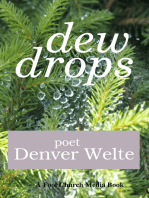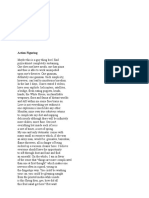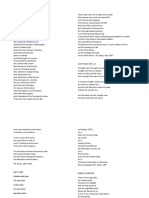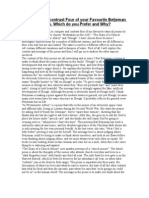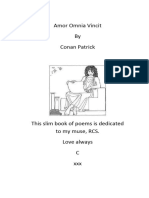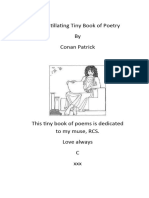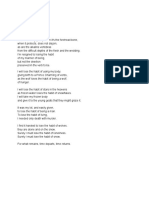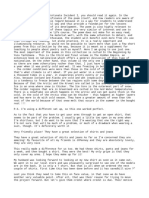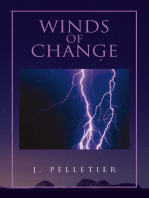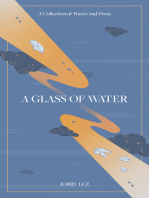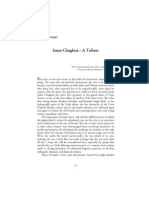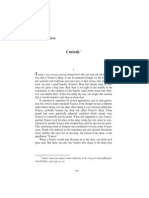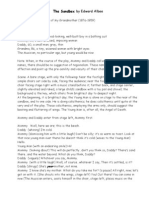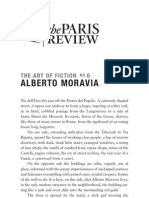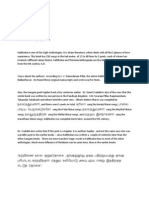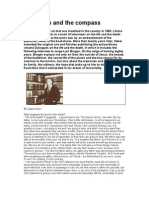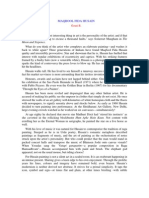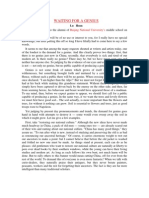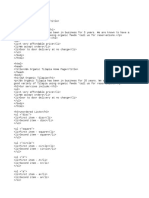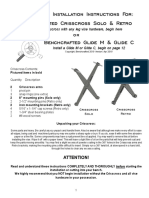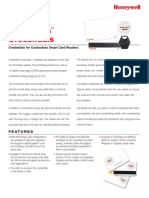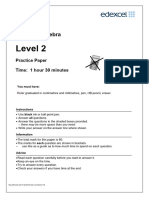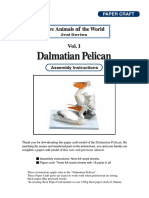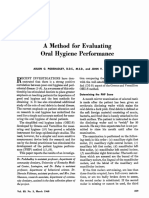Professional Documents
Culture Documents
Japanese Poems
Uploaded by
writerhariCopyright
Available Formats
Share this document
Did you find this document useful?
Is this content inappropriate?
Report this DocumentCopyright:
Available Formats
Japanese Poems
Uploaded by
writerhariCopyright:
Available Formats
1
TEN JAPANESE POETS
The Bird The bird Throws me a quick glance And then He pushes off from the branch Right away He is gone As if to say A long time ago humans caught a horrible disease That keeps them from flying Hiroshi Kawasaki
The Bird The sky flies the bird close in It flies him far away It erases the poppy-seed speck of him That is all the sky can do for him All we can do for him is to say "Birds fly"
Dear Bird, Won't you remove both wings for me? Because I believe
2 It's not simply having wings That lets you glide through the sky That lets you look so imperial Tree Yes, often an olive wants to be a fish, An almond often wishes to be a bird I am pretty well accustomed to being like this now Just a while ago I changed into human form For a few minutes My supple soft skin, my bones and the flesh wrapping around them They all felt eerie to me But in a while when I revert to being a tree How fondly I will reminisce About the human body I have now My fingers, nails, and joints
How marvelous! I have bones; I have muscles to pull my bones, And skin covers all My blood is coursing on and on I can move myself, like this, any way I want to I can point at the sky I can stroke my hair!
Grasses, leaves, fruit or branches cannot do what I can
3 They stretch their branches, turn their leaves Lazily toward the light, Yes, really, lazily as youd say in human tongue But when I was a tree, it did not feel so lazy Rather, it was more like securely Rather, it was more like steadily What is this fury inside the human body? It makes me dizzy Look Bones and muscles shed their old selves To make new bones and muscles
Much has changed between now and just a while ago When I first met you So this is what aging means, isnt it?
Uh, Your two manly hands Like rough palm leaves Rest on my two shoulders What is this numbing warmth your hands convey To my muscles and bones? To speak We trees dont have words Time is running out
4 Once the time comes, I wont ever be A human like this, forever Tell me How else are humans different from trees? What is this? What is this mysterious warmth That comes to me through your fingers? Tell me, Something I missed doing Not much time left Yes What a pleasant thing to do, to respond.
Please, tell me.
As I place my hand here like so The sound of your blood rushing in your chest Grows so fast
Time is running out. Please, please tell me What is the biggest thing I missed doing.
I feel as if there is something I should do, something fervent Something Id move my muscles for Something Id violently rub my joints for
5 To chat Isnt there something else that is more important? What is it? What is this something humans do to be wholly human?
Just a while back When you placed your manly hands on my womanly shoulders My female muscles and bones felt a certain Fulfillment and warmth Doesnt that have much to do with What I have yet to do? Am I not missing something Something violent That goes well with the fury of metabolism In this human body that holds bones and muscles?
But maybe I am wrong Am I just babbling human words While thinking like a tree? What? Are you saying Ive missed doing something? Tell me Please Why do you hesitate? So you are saying, arent you, it is different from
6 Talking, Pointing, Jumping, Counting numbers and the like?
Goodness, how pained you look!
I thought humans had a wonderful thing called words Which allow you To convey, to inform or to express anything you want to, But there are things that words cant help Ah, theres no time left
I want to know What it is that I missed doing
With no words, This Is what you can tell me, isnt it?
As you clasp my shoulder as you are doing now With your five fingers wrapped around my shoulder Your thumb Your forefinger Your middle finger
7 Your ring finger And your little finger Five shocks run through me
Hurry! Time is running out!
The Room The room was filled with Darkness like silk From inside A graceful hand Carefully closed the door
As dark as it was The room Waited for a storm
In the middle of thunder and lightning Only for a moment The room would be faintly lit
10 WHAT I SECRETLY SAY I boasted several times that if I could not make a living by writing Id do anything even shine shoes.
Now Im not so sure whether I could really do shoe-shining.
A twenty-six year-old fishmonger was talking on TV about the time he decided to marry his present wife:
Id do anything to give you and our children a comfortable life even be a beggar, I told her.
Another man there about the same age had said this: Wed have a poor, hard life, but would you go along with me? I said, and she said yes.
11
Twenty years ago I would have slapped my knee at what the fishmonger said, and I wouldve said, Thats great!
Now what those two men said dazzles me.
An idea flashes across my mind which, if my wife heard of it, would make her keel over. I may have already done in secret what, if my daughter had known it, would send her at me with a shovel. And I have the surprising idea that I am more normal now than before.
12 The Bird The bird Throws me a quick glance And then He pushes off from the branch Right away He is gone As if to say A long time ago humans caught a horrible disease That keeps them from flying
SUNDAY Getting up in the morning I take my hunting gun down from the wall, shoot the coffee on the table and slowly yawn.
I walk into the ocean. When I lie back on the waves my face and ignorant toes poke through the surface.
Then my back timorously questions May I sleep now?,
13 while my thighs dont know what to do with themselves. Only my hands, not forgetting, knowingly paddle little by little.
I get out of the ocean. On the beach I pick up a fish as large as myself and sling it across my shoulder. I hoist its slimy weight into place. Still alive, it sometimes twists and turns and makes me stagger.
A young girl with erect nipples comes towards me. I put the fish down. I remove the straw wrapping from around my penis.
14 SO VERY Whats that, so far away something running extremely fast, so far, far away, being beaten black and blue, as if its body has been thrashed to a pulp, as if its making a faint, faint sound? Incredibly fast . . . Is some old friend of mine having a terrible time of it? Is every loathsome memory of mine running this way with unstoppable force? Or is a car overloaded with flowers being torn apart and laughing strangely?
15 Incredibly fast, that . . . So very far away. SNOW Id like to meet the Snow Woman*.
Id like to draw on that hot skin of hers a picture of a snow crystal found nowhere else.
Not about the present day or crimes and so on, but Id like to tell a story more secret and more true. And I wish to defend it with my entire being.
When it starts snowing, my heart or body, I dont know which, begins to tremble. Isnt that because, though I had met the Snow Woman long ago, the snow has made me SNOW
Id like to meet
16 the Snow Woman.
Id like to draw on that hot skin of hers a picture of a snow crystal found nowhere else.
Not about the present day or crimes and so on, but Id like to tell a story more secret and more true. And I wish to defend it with my entire being.
When it starts snowing, my heart or body, I dont know which, begins to tremble. Isnt that because, though I had met the Snow Woman long ago, the snow has made me forget all about it?
17 Morning A girl is running towards me In the morning Light Her supple hair Melts into the sunlight Blinding me
Her hands Her skirt, her shoes, her body All Have melted into the sunlight Now transparent Just the girl Running this way
The sunlight Moves into the woods in the morning The girl becomes green Tree tops whisper to each other As if theyd heard their mother tongue, one morning, In a foreign country
The girl goes out to the meadow in the morning A pair of cream-colored horses are eating dewy grass
18 How will the green of the grass Change inside the bellies of The cream-colored horses? Wonders the girl.
Wondering, the girl comes to an orchard Apples, in the apple orchard, are about to ripen Fragrance saturates the air and lingers Like mist In a white room The girl becomes Imbued with the smell From when no one knows From where no one knows A red color appears The red skin grows resilient Apples in the apple orchard Resist bursting In the bright light
The girl is Running on and on
Ice breaks
Wind rises
Squirrels awake
19
The girl Comes into my room where I am asleep In the morning light My mind, like some towel, is dyed various colors Sometimes stripes In my dream The girl and I Are subtly offset
Am I hearing the sound of water welling up? Am I seeing how time moves on?
The girl and I Delicately go Beyond the dream
The girl slowly fades Slowly I grow fulfilled And Soon
I see The sun!
20 Hiroshi Kawasaki
July 1, 2006 Hiroshi Kawasaki was born in Tokyo in 1930, the son of Kohei Kawasaki who worked for a newspaper company. In 1944, his family moved to Fukuoka in South Japan, escaping the war. It was during his high school years there that he started writing poems. In 1948, he entered the English literature department of a local college but had to give it up in the following year because of his fathers death.
Hiroshi Kawasaki moved alone to Tokyo in 1951 and started work as a day labourer at the American navy base camp located in Yokosuka. He met with Noriko Ibaragi for the first time in Tokyo Central Station in March 1953 and discussed launching a poetry magazine. In May, the first issue entitled Kai was launched and the poetry collective by the same name was established to include Shuntaro Tanikawa, Yujiro Funakoshi, Hiroshi Yoshino, Toshio Nakae, Tatsu Tomotake, Makoto Ooka, Erio Kishida, Seiichi Yoshikawa, Yasukichi Ootaki, Koichi Iijima as members. Kawaskis first book of poetry, A Swan, was published in 1955 and his first poetry drama About the Sea was aired on radio.
After getting married in 1957, Kawasaki continued to work as a guard at the US Navy Yokosuka base camp until 1960, when he changed to another company. The following year, he quit his day job altogether and became a full-time writer, earning his living and supporting his wife and children by writing at first mostly for radio and later many different books for publication.
He remained living in Yokosuka with his wife and children until his death in 2004.
21 Mother Leads Us on Board (from 'WILD GRASS UPON A RIVERBANK') Mother leads us along And we get on board We get on, get off, then on again We board cars and busses We board planes Then more buses and trains and cars
The place where we arrive is a building full of muffled voices, it has a cold corridor where people have gathered in droves, theyre all looking confused, theyre all looking confused as they dont know whatll come next, theyre sitting and looking around with wide open eyes, the room becomes dark, and mothers form rises up
Mother mumbles to herself So what do we do now? Mother taps the floor with her wrinkled hand and whispers Its because you was born were living like this Mother closes her eyes halfway, grabs her breasts and scolds us She repeats Its been so hard since you were born Its been so hard since you were born My little brother begins to sob I ask him whats the matter He says I hate it here, I hate it here He says I dont want to see her He says I want to run away and go home Shes mean, she makes me sick, shes dirty
22 Its like shell rub off on us I dont want to see or hear her, I want to go home My little brother sobbed in sorrow as he speaks
All the people have unfamiliar faces, they sit in unfamiliar fashions, no one seems to understand Japanese, mother is sitting alone on a stage then she stands up and thumps her feet against the floor, to everyone else it is nothing but noise, then mother squeezes a noise from her mouth, to me it sounds more like a voice than plain old noise, it has meaning, it has emotion, it is sad at moments and happy at moments, it has meaning, it has meaning, but to all the other people, its nothing but noise
Mother says Were grown up, were laughing, living bodies, all cause were alive Mother repeats Were grown up, were laughing, living bodies, all cause were alive
Once I asked mother, do all those people understand? Mother responded I dont think so Why are you doing that if they dont understand? Doesnt your voice just come out and fade away? Mother responded I wonder Why do all those people come if they dont understand? Mother responded Isnt it precisely because they dont understand? Mother repeats over and over Living bodies, cause were alive
23 Whyve we come somewhere no onell understand us? Mother responds Maybe we can get some money Mother repeated over and over Living bodies, cause were alive I hate it here, my little brother says Go to sleep, I whisper He puts his head between his hands Covers his ears, closes his eyes And before long he stops moving I also am starting to doze My little brothers eyes are closed Still covering his ears, he falls sound asleep And starts to melt away I also am starting to doze Thats me, thats me Thats me, thats me The voice fades away, mother gives a small laugh Relieved, the other visitors laugh too
Were shaken awake, the men bark out long strings of words we cant understand, my little brother and I dont know how to respond, mother is speaking to some people and doesnt even turn to look at us, shes speaking to some people and doesnt even turn to look at us, then hours later, mother finally looks back at us and tells us were going, she leads us to a hotel, without even combing our hair we crawl underneath the stiff sheets on the narrow bed and fall asleep, my little brother is soft and warm, mother is hard and cold, mother and I fall asleep holding my brother, we fall asleep, everyone touching everyone elses arms and legs, their dry hands caress me during the night, I am so tired I dont even brush their hands away when they pull my ponytail in their sleep
24
Mother leads us along And we get on board We get on cars and busses and planes Then more busses and trains and cars My little brother says that was fun At one of the airports where we got on The room we were waiting in Turned into a bus and started moving Then merged with the plane But I dont remember getting on anything like that
We sleep here and there in the airports, we play here and there in the airports, we tumble over and bump into things here and there in the airports, I get scolded, my little brother cries, food is bought, we dont eat it all and throw it away, we coax mother for things, we get scolded, there are lots of families like us, parents let their children eat, parents scold their children, some of the families traveling from airport to airport have their hair cut, some have it braided, some have it tied up, some have it shaved right off, but everyone is wearing clothes of different colors, everyone is waiting, everyone is spread out all over the airport waiting all over the place, every last one of them is waiting except for the children who are not eating or sleeping or waiting but tumbling over, bumping into things, and playing just like us
It is dark inside the planes I watch the movies but the screen is either too far away or too close In the seat next to mine My little brother slumps over asleep Mother has covered him up in darkness I watch the movies People get angry and get killed
25 In a language I dont understand In the seat next to mine My little brother slumps over asleep
After I thought she had fallen asleep, mother starts moving under the covers in the darkness with a certain monotonous rhythm, then she lets out a long breath and stops moving, when she does this I smell the same sweet and sour scent as always, it is not the smell of passing gas, nor the smell of breast milk, nor the smell of her navel, after she lets out a long breath and stops moving she falls asleep, I try doing the same thing, then I stretch and spread myself out slowly, allowing me to sleep a little, allowing me to sleep just a little
I watch the movies If I dont put on the earphones I can get away without listening To their angry shouts and death cries In the seat next to mine My little brother slumps over asleep In the darkness mother weeps silently to herself Quietly she weeps to herself
When we get off the plane my little brother throws up The long, long conveyor belt clatters along Mother holds my brother covered in vomit And walks along the conveyor belt with great speed As the long, long conveyor belt clatters along
26
After I thought she had fallen asleep, mother starts moving under the covers in the darkness with a certain monotonous rhythm, then she lets out a long breath and stops moving, when she does this I smell the same sweet and sour scent as always, it is not the smell of passing gas, nor the smell of breast milk, nor the smell of her navel, after she lets out a long breath and stops moving she falls asleep, I try doing the same thing, then I stretch and spread myself out slowly, allowing me to sleep a little, allowing me to sleep just a little
I watch the movies If I dont put on the earphones I can get away without listening To their angry shouts and death cries In the seat next to mine My little brother slumps over asleep In the darkness mother weeps silently to herself Quietly she weeps to herself
When we get off the plane my little brother throws up The long, long conveyor belt clatters along Mother holds my brother covered in vomit And walks along the conveyor belt with great speed As the long, long conveyor belt clatters along
It takes one day and one night to reach immigration, the route is lined with many, many immigrants who have collapsed along the way and shriveled up, no matter how wealthy the country, they never make the path to immigration any shorter, their wealth wont help us, there is just sadness, curt answers and pain, immigration is nowhere in particular, and to make matters worse, there is no guarantee well make it through, my little brother doesnt notice but I do, our passports are bad, I had noticed that at immigration in every country, the men make mean faces and stare at their computers, thats cause our passports are bad, my little brother tried looking into the computer and got scolded,
27 not just once, not just twice but more than that, the men point us to another window and mother leads us to one place after another, rushing us here and there
As mother leads us one place after another Rushing us here and there All sorts of things get pulled out Telephone lines and books of telephone numbers and postcards And old passports punched full of holes And leftover airplane food and changes of pants And apples with missing bites and the tip of a dried-up arm And small bottles full of bugs The bugs are dead inside the bottle Some man calls out to us, you dropped something, you dropped something You dropped something, you dropped something, pick it up, pick it up So we pick it up And put it back where it belongs Mother leads us one place after another Rushing us here and there And when we reach the window, no ones there So we wait before the empty window Theres no guarantee the window will open My little brother asks what will we do if no one comes? My mother responds then this is where well live And with that she smiles
28 In one corner of the great immigration hall my little brother is slumped over asleep in the row of hard chairs before the empty window, watching him is enough to put me to sleep too, something is pulling at me so I brush it aside, its that dried-up arm, the tip seems to break when I brush it aside, it makes a dry sound as it falls to the ground, no sooner do I realize whats happened then someone shakes me awake, mothers standing up and saying were ready to go, I ask if the bad part of our passport had gotten fixed, she tells me no, she tells me a bad passport is always bad, we go outside the airport and as we put our three bad passports away, mother nudges us as if to say, look were going
Once again were getting on board No matter how often we arrive Our journey still does not end - Hiromi Ito
29 Mother Leads Us to the Wasteland Where We Settle Down (From WILD GRASS UPON A RIVERBANK)
Mother leads us along and we get on board We get on and off again Boarding cars and buses and planes Then more buses and trains and cars
I am beginning to think this life will go on forever, itll go on forever, but one day it stops all of a sudden, that day isnt especially different from all the others we spent aboard all those buses, trains, cars and airplanes, when we leave the airport just like always mothers smiling and theres a man in front of us, he presses his face which is covered with bushy jet-black whiskers against mothers face, he sticks his tongue in mothers mouth, wriggling it as it goes in, then he grabs mothers breasts, shoulders, stomach, and hips and gives them a hard squeeze
Mother makes little sucking sounds at the mans mouth
Closing his eyes, the man makes a little groan as he tastes mothers saliva, sniffs her scent, strokes her skin and her flesh, when the man removes his mouth he spreads his arms wide and says ohh mai ohh mai and hugs me and my little brother, he puts us into a gigantic car, the sky is blue here, it is really really blue, we drive for several hours, for several hours beneath the blue sky before we arrive at the big house in the wasteland, theres a sprinkler in the yard and it turns on at night
Ohh mai, it would soak everything in sight
Mother tells us where we will sleep then goes into the mans bedroom
At the crack of dawn, theres a loud noise, the sloshing noise of rinsing a mop in a bucket of water, the slippery sliding sound of scrubbing, the sound of mothers voice as if shes singing or breaking down in tears, this goes on for days and days on end, at first it wakes me up but with time I get used to it and dont get up anymore
30
During the day, mother uses words we dont understand to tell the man every teeny tiny thing my brother and I say, then they start talking to us in those same words, at first Ive got no idea what theyre talking about, but then with time I get used to that too
Then mother starts standing in unfamiliar stances, walking with an unfamiliar walk, cooking with unfamiliar foods, she makes us eat us her cooking, its still good even if she used unfamiliar foods just because she made it, we realize were gobbling up her food left and right
Mother leaves off an unfamiliar scent, that man is always at the dinner table, mother embraces and strokes us in unfamiliar ways, this sort of thing has happened before, mother would settle down with a man, shed drag us into it, and every time wed get dragged right in as if it were nothing at all
Mother doesnt go get on board anything anymore, we dont trail after mother any more or walk from airport to airport like our lives depend on it, one day that man uses an unfamiliar name to call out to mother, she responds as if nothings the matter at all but she says she would take him to task
Who cares about a name as long as youve got one? Words fulfill their usefulness as long as they get through You two, mother said to us, Lets not use Japanese any more
I am eleven, my little brother is eight We stop speaking But when we speak to each other or to mother We continue to use nothing but Japanese We stop speaking everything but Japanese When people approach, we fall silent When they leave, we start speaking again
31 We speak Japanese Japanese is all we have We speak only Japanese I start pricking up my ears My little brother does too For years and years, we prick up our ears One day I try asking my brother Are you listening to something? He answers I cant hear anything I try asking again Are you listening to something? He answers Im not listening to anything We prick up our ears for years on end
One day when I wake up, theres a babys car seat next to my pillow, and in it is a newborn baby, ohh mai gossh, a newborn baby, I ask, when did we get that? mother says yesterday, mothers belly is still swollen like shes still got more babies in her womb, babies to whom she hasnt yet given birth, the baby starts crying like a little cat, mother bares her breast, its an altogether unfamiliar shape, it has swollen up and become dark and fierce, it smells so raw and fresh that I have to hold my breath, the little baby shifts its little head and starts sucking on it, mother takes out the other breast and exposes its heavy, swollen shape right before our eyes, she bends it, twists it, and breaks open the tip, the milk flies out in an arc, my brother screams eeewww, mother says try it, try sucking it, its sweet, youll be sure to like it, we hesitate, then mother grabs my little brother and forces it into his mouth, the breast looks much bigger and fiercer than my little brothers head, and mother looks still bigger and fiercer than that, the bubbling milk comes squirting from its smiling, split tip, with resignation my brother takes it in his mouth, mother squeezes and strokes it two or three times, I hear the sound of him swallowing one gulp after another, guroooss, he says, his mouth dripping with her white milk
32 The wind changes directions So it blows from the desert Dry as a bone In the distance, a mountain burns A mountain burns, raining down ashes The ashes block out the sun The sun watches with its naked eye The plants turn to corpses Dry as a bone The sage releases its intense aroma The rabbits and coyotes turn to corpses Dry as a bone When winter comes with its rain All grows wet, moss grows, sprouts emerge, flowers bloom The cacti and yucca grow long and lanky Everything beneath heaven becomes a sea Everyday the sun falls in the sea
Mother says, Id like to start rowing, rowing over there to the other side of the sea, she says this in Japanese, but no one tells her to go, no one tells her to go home so she just stares at the sea
When we came here I was eleven, my little brother was eight Since then weve tried using Japanese But the sounds that drip from our mouths When just the two of us talk
33 Only emphasize how much weve forgotten My little brother and I push sounds out our mouths We push sounds out our lips and palates We extract them from our noses, catch them on our tongues We leak them out unintentionally One day, my brother says Ive katto my finger Theres blood trickling from it His words are a mixture Of English and Japanese One day, my brother says Sis, whats my name? do you know? I say to him Its Zushio My brother says No one can say it, no one can pronounce it No one can say my name at all I repeat to him Its Zushio The baby grows bigger and begins blabbering baby talk Saliva drips out of its mouth the whole time Then before long it begins forming words As if to deride my brothers distress
This all happened long ago
34 Mother led my brother and I along And we got on board We got on and off and on again Boarding cars and buses then planes Then more buses and trains and cars We got on board And began to move Still, no matter how much we move Our journey still does not end
35 The Maltreatment of Meaning Can you speak Japanese? No, I cannot speak Yes, I can speak Yes, I can speak but cannot read Yes, I can speak and read but cannot write Yes, I can speak and write but cannot understand I was a good child You were a good child We were good children That is good I was a bad child You were a bad child We were bad children That is bad To learn a language you must replace and repeat I was an ugly child You were an ugly child We were ugly children That is ugly I am bored You are bored We are bored That is boring I am hateful
36 You are hateful We are hateful That is hatred I will eat You will eat We will eat That is a good appetite I wont eat You wont eat We wont eat That is a bad appetite I will make meaning You will make meaning We will make meaning That is conveying language I will use Japanese You will use Japanese We will use Japanese That is Japanese I want to rip off meaning You want to rip off meaning We want to rip off meaning That is the desire to rip off meaning I want to show contempt for language as nothing more than raw material You want to show contempt for language as nothing more than raw material
37 We want to show contempt for language as nothing more than raw material That is, language is nothing more than raw material I will replace words mechanically and make sentences impossible in real life You will replace words mechanically and make sentences impossible in real life We will replace words mechanically and make sentences impossible in real life That is replacing words mechanically and making sentences impossible in real life Rip off meaning Sound remains Even so we search for meaning. The primitive reflection of a newborn sucking a finger if one sticks one out It is the primitive reflection of a newborn sucking a finger if I stick one out It is the primitive reflection of a newborn sucking a finger if you stick one out It is the primitive reflection of a newborn sucking a finger if we stick one out It is the primitive reflection of sucking if a newborns that sticks out a finger As for me, meaning As for you, meaning As for us, meaning Is meaning, that is Do not convey As for me, do not convey As for you, do not convey As for us, do not convey Do not do it, that is conveyance Meaning ripped apart and covered in blood is surely miserable, that is happiness I am happy meaning covered in blood is miserable You are happy meaning covered in blood is miserable
38 We are happy meaning covered in blood is miserable The blood-covered meaning of that is blood-covered misery, that is happiness
39 Coyote My grandmother was a medium My mother was a magician My mothers older sister was a geisha My mothers younger sister had tuberculosis My mothers other younger sister was barren All were wonderfully beautiful The spells mother taught me All required sak, rice, and salt We were afraid of snakes, water, and the east
My daughter began speaking baby talk at two months When the coyote speaks to her She smiles and always responds The coyote: A dry plain, plain, plain My daughter: Plain, plain, plain The coyote: No lying My daughter: No lying, no lying, no lying The coyote: Hungry, hungry My daughter: Hungry too Coyote: Hah, hah, hah My daughter: Haaaaaaaa-ohh My daughters father, my father: I wanted to concentrate just on the coyote I wanted to isolate myself, insulate myself, see nothing other than the coyote And I wanted to trade places with him
40 The milk flows from my breast bountifully To fatten my daughter it flows in overabundance, much too much My grandmothers milk also flowed bountifully With it she fattened her four girls and two boys My mothers older sisters milk also flowed bountifully With it she fattened her three boys My mothers milk also flowed bountifully With it she fattened just me, and the leftover milk flowed out My mothers younger sisters milk also flowed bountifully With it she fattened her two boys My mothers other younger sister nursed and nursed her adopted child With her milkless breasts until eventually The milk began to flow from her body There is so much rain Everything and anything gets soaked Inside a damp frame, grandmothers beautiful smiling face with no eyebrows or teeth My mothers older sisters beautiful face with no chin, teeth, or hair but with large lips My mothers younger sisters beautiful face with fleshy, hairless lashes and no teeth My mothers younger sisters beautiful face with spots and no teeth My mothers beautiful face with sagging cheeks, crows feet, and no armpit hair nor teeth But all of them do have breasts that sag
The women all enjoy fondling the babies in the family My daughter Is the only female grandchild
41 Is the only female niece
The words of the women who fondle the babies in the family Slowly turn to baby talk before our eyes The women from age ninety to fifty gather (The ninety-year-old has been dead for a decade) The women sit together and Begin to speak in baby talk Gyaaatei Gyaaatei Haaraagyaatei Harasoogyaatei
My grandmother was a medium My mother was a magician My mothers older sister was a geisha My mothers younger sister had tuberculosis My mothers other younger sister was barren My grandfather was a paralytic My mothers older brother died young My mothers younger brother did not speak at all My father was related to none of them My mothers husband and my husband Vanished right before I gave birth to my daughter
42
Coyote: Gyaatei My daughter: Gyaatei Coyote: Haaraagyaatei My daughter: Haraharagyaatei Coyote: Gyaagyaagyaatei My daughter: Haragyaatei
The precipitation and humidity this time of year My mother chants her magical spells Cursing the humidity Sak and rain Rice and rain Salt and rain Ordering the water To flow to the east Forgive us, oh honorable snake
Sak and rain Rice and rain Salt and rain Translation: 2009, Jeffrey Angles From: Killing Kanoko Publisher: Action Books, Notre Dame, Indiana, 2009
43 Translator's Note: Translators note: In the 1980s, It became fascinated with the poetic traditions of Native Americans which she read in the modern, colloquial translations of Kanaseki Hisao. She was struck by the combination of ancient myth and contemporary language, and soon afterward, she tried her own hand at using contemporary spoken language to write in a semi-mythological mode. This poem is one result of that interest.
Shamanism and magic remained an important part of everyday life in the remote regions of Japan until relatively recently. Its grandmother was a shamaness who claimed to speak to the dead, and Its mother claimed to have magical powers and taught her children her spells. This poem explores the mystical connection between It and the various generations of women in her family.
The second paragraph of Coyote derives its inspiration from the German performance artist Joseph Beuys. In 1974, he came to New York and immediately installed himself in a gallery, where he remained in a small room with a coyote for three days. Beuys later explained his piece, I wanted to isolate myself, insulate myself, see nothing of America other than the coyote. Through forging a spiritual connection with this animal, which Native Americans had believed to be divine, Beuys hoped to come to start the process of making amends for the destruction waged upon the culture and environment of the Native Americans.
The exchange between the coyote and the daughter contains a bastardized quote from the Heart Sutra (Hanya shingy), a short Buddhist sutra which some sects believe to express the essential concepts of the religion. The sutra concludes with a mantra, which if read in Japanese, states Gyatei Gyatei Haragyatei Harasogyatei Boji Sowaka (Gone, gone, to the other shore, gone, reach, accomplish enlightenment). In the poem, the coyote and the daughter do not repeat the excerpt from the Heart Sutra accurately. If anything, it becomes a symbol of a sort of mysterious, mystical exchange between them.
44 NASTY MORNING More than through skin, more than through sex Unease is something that becomes clear through language Something that makes me particular There were no accentual modulations in that language Surrounded by accentless speakers I couldnt carry on a conversation I was illiterate too I abhorred written language Their accentless addresses frightened me Didnt feel directed toward me If I answered, my language Sounded ugly, sounded deformed I could not erase that When I catch the delicate nuances of accent In the language he learned in a land far away I wanted to wash it all away Language spoken aloud is all mine Knowledge Emotions Time, things we eat Even if under the influence of others Even if under the control of others Even if the language he writes is understood only by others far away The language that enters my ears, comes out my mouth
45 And disappears is all my own Something I want to claim Even if wet with my saliva As I scrub him late at night I imagine washing all that accentless language From his skin of his freckled back
Dee suiiteshita retoru omen (the sweetest little woman) He taught me this once De suiiteshita meen (the sweetest man) I imitated him Parroted language One breath, then another He was a strange frog, a cricket Pronouncing with ease But first he taught me Nashite mounen (nasty morning) Next ae habu eten purente (I have eaten plenty) Next ae an nata hangure (I am not hungry) Next yu aara nata hangure (you are not hungry) I touched his language that day for the first time When I did I was jealous of language With it he is connected to the world outside He writes, people read, that remains
46 But just then, he spoke to me in his language that remains Just like my language His is voiced then disappears Even if relationships disappear there Even if memory disappears there This language, voiced and disappearing, is suiito I wanted to study and understand his language Even if only like those boys It makes me sigh with regret Still, the words I spoke made him crazy He said he thought about them for ages My language threatened The freckles on his back They moved, they squirmed For his thick arms, how light I must have been, like an imp or fairy My language percolated through his voice then became free Taking on the heat and scent of his body It coiled around me then disappeared Through language He dug into me Searched for me So heavy from the imps and fairies settled there Searching out And finding
47 My skin My lips
Hiromi Ito
Translation: 2009, Jeffrey Angles From: Action Books Publisher: Notre Dame, Indiana, 2009
Translator's Note: This poem borrows quotes from the journal of Koizumi Setsu, the Japanese wife of the nineteenth-century, European-born writer Lafcadio Hearn. Her journal contains phonetic transcriptions of the English her husband attempted to teach her. Although she never successfully learned Hearns language, he learned hers, took a Japanese name, and became a Japanese citizen, and wrote many bestselling books introducing Japanese culture to the English-speaking world. Several of the works that he wrote, including some stories of ghosts and other impish creatures, are believed to have transcriptions of stories that Hearn learned from his wife. In other words, the flow of language and learning between the two was a two-way street, as this poem suggests. Koizumi Setsu wrote her journal while living in Kumamoto, the same southern city in which It spends part of each year. Kumamoto dialect is known for having few accentual modulations, yet to Koizumi Setsu, her husbands English sounded as if it had even fewer. Like several other poems that It published in the late 1980s and 1990s, this poem deals with the theme of the imperfect communication of language and the ways that language affects bodily experience. Hiromi It (Japan, 1955) Hiromi It, born in 1955 in Tokyo, is one of the most important and highly regarded poets in Japan. Since her sensational debut in the late 1970s as a free-spirited and intelligent female poet with shamanisitic qualities, Ito has published more than 10 collections of poetry including such monumental works as Oume (Green Plums, 1982), Watashi wa Anjuhimeko de aru (I am Anjyuhimeko, 1993), and Kawara Arekusa (Wild Grass upon a Riverbank, 2005) which won the prestigious Takami Jun Award.
She has also written a dozen essay collections on such diverse topics as child-rearing, foliage plants and English lessons, collaborated with the photographer Nobuyoshi Araki and the feminist critic Chizuko Ueno, creatively translated the medieval Buddhist stories and a 19th-century novel into
48 modern Japanese, and published novellas, two of which were the finalists for the Akutagawa Prize, the Japans most prominent award for literary fiction.
It has been consistently expanding her creative spheres over the last decades: from the relationship between the sexes, motherhood, the oral traditions of Native Americans, and pop songs from the 1960s, to the lifecycles of plants, just to name a few. As the critic Nobuaki Tochigi points out in the attached article, she is an omnivorous poet who can transmit and transform a variety of literary legacies.
But whatever she writes in whatever form, one can always recognise qualities that are unquestionably hers, qualities that remind us of the wandering minstrels in Medieval Japan who delivered their poems by voice alone and not by written text. She seems to be obsessed with moving, both in her real life and in her narratives, and with the voices that just come out and fade away. After having left Tokyo for Poland and then for Kumamoto in Southern Japan, Ito now lives in California, writing in Japanese and visiting Kumamoto frequently.
In this issue of Poetry International Web Japan, we are pleased to introduce the first two chapters of Kawara Arekusa (Wild Grass upon a Riverbank), which is her latest and undoubtedly the most important work, with an English translation by Jeffrey Angles. While it shows only a part of the 140page epic poem, the above-mentioned essay by Nobuaki Tochigi should be helpful in giving an overview of this masterpiece compilation of the tales and songs which she has created over the past 15 years.
We are also posting Its own readings of Watashi wa Anjyuhimeko de aru (I am Anjuhimeko) both in the original Japanese and in the English translation by herself as an audio file. Jeffrey Angles, who has also translated the book-long series of these prose-poems, wrote as follows:
The poem Watashi wa Anjuhimeko de aru represents a reworking of an oral text recorded from a shamaness in northern Japan in 1921. The story collected from the shamaness, in turn, represents an alternative variation of the famous medieval legend of Sansho Dayu (Sansho the Bailiff), which many Japanese artists have used as the basis for novels and films. In reworking the text collected from the shamaness in 1921, It has drawn upon her knowledge of feminist psychology and incorporated references to Japanese folklore and the Shinto creation myth from the eighth century Kojiki (Record of Ancient Matters).
49
Also available here are her shorter verses, an autobiography and a selected bibliography. We hope you will enjoy the exciting world of Hiromi It!
Yasuhiro Yotsumoto
50 Inuo Taguchi (Japan, 1967) Welcome to Inuos Land!
It is a fantastic land where General Moo, a former dairy cow, passionately demands that the fences of all the worlds pastures should be abolished; where Jesus Christ gets out a take-out turkey sandwich in Central Park and remembers how John Lennon ate up all the unpolished rice in the world; a land where characters from pop culture and literary history, or sometimes of the poets own imagination, meet in different times and spaces, following not human logic but Armadillogic instead.
Yet it is far from an ever-euphoric Disneyland: as you read your way through, you will discover a land of sorrow and pain as much as love and humor, a land where you might have to tell Superman, now in a wheel chair, that there are no more skyscrapers to look down, that good and evil are no longer what they used to be.
Inuo Taguchi (Inuo, his pen name, literally means Dog Man) was born in 1967, a few years after the Tokyo Olympics which heralded the end of the post-war years and the start of the economic miracle in Japan. He grew up in Tokyo, able to enjoy those days of go-go economy, but it was only after the bubble burst and the stock market collapsed that he started writing poetry. At the same time the Berlin Wall and the Soviet Union were also falling. His first book of poetry 20th Century Orphan came out in 1995 right in the middle of the Japans economic debacle, while the world was quickly shifting from the cold but stable East-West paradigm to new bubbles of uncertainty and hostility:
Lenin is relieved That the bronze statue of himself was taken down. In fact for half a century, He has wanted to lie down in Red Square And listen to the Beach Boys
51 (From Lives of Great Men)
These lines could well have been written in Kiev or San Francisco and are easily translatable from one language to another, because they belong to the newly emerging global village instead of any particular place or people. In fact, Inuos poetry is characterized by being elegantly free of the cultural and literary codes of traditional Japan, and somewhat artificial and detached in its style. Indeed, it is more reminiscent of Haruki Murakamis novels.
In fact, just as, in the late 70s, Murakami appeared as an antithesis to preceding Japanese novelists, Inuo Taguchi was writing poetry which stood in distinct contrast to the mainstream Japanese poetry of the 1970s and 80s. While the poems of his contemporaries were seriously intellectual, his were light, concrete and precise, and intelligent without being academic or ideological.
But unlike Murakami, who usually takes the first persons I in his narratives and obsessively searches for his own place in this cruel and violent world, Inuo rarely, if ever, deals with himself directly in his poetry and often uses the dramatic monologue of other characters as a vehicle. His self seems to be hiding behind the protective walls of his delicately crafted Japanese, letting the world itself speak. Unique in the modern poetry scene, Inuo is one of those self-less poets whose capability lies more in his negativity as John Keats put it.
Over the past decade, Inuo, who often does his readings barefoot on stage, has become one of our finest and most appealing voices, and features amongst Japans leading contemporary poets. His second collection, General Moo, winner of the prestigious Takami Jyun Award, was published in 2000, followed by Armadillogic in 2002 and Hush-a-Bye in 2004. Sometimes armored with wit and humor, sometimes with painful innocence and sincerity, Inuo plays his tunes for those who dont usually read poetry but whose souls are in need of it:
Until the exhausted people in this country stop inflating their words with as much baking powder as they can scrape together, and start instead speaking with words that are as lively
52 as spankers, your ears would wait patiently no matter how many decades or even centuries it may take.
Yasuhiro Yotsumoto
53 AN INVISIBLE WAITER Maitreya Bodhisattva, raising a bite of rare steak to his mouth, said, Even we sometimes get hungry. Mere peace of mind doesnt satisfy the flesh, though, on the contrary, the sense of fullness at times does lead to peace of mind.
Each of us is aware that we should avoid eating unbalanced meals. Our calling requires nothing but the capital of soul and body. The American way of taking nutritional pills, however, is severely prohibited by Buddha.
Maitreya Bodhisattva, using knife and fork quite adeptly, talked on and on with the accent of Pure Land Buddhism. I had a very hard time learning European table manners. Anyway we had to master all at once in a three-night training session what Europeans had developed over hundreds of years.
Of course even we are not perfect. Like you, we have our troubles. There are some anorexic ascetics and some depressive goddesses of mercy. A Bodhisattva I met the other day in a Laundromat has insomnia, so at night he seems to read by reading lamp Romance of the Three Kingdoms. He said he hadnt slept for an entire month
54 and had now read 3,000 pages.
And a nirvana incarnation I know well who seems to be categorized by the present administration as a bed-ridden old man was high-handedly removed to a special old folks home in Shibuya. I saw him for the first time ever crying, No! No!
It was already late at night. All the waiters had gone home. All that remained was peoples sighs, like the laughter of the Cheshire cat.
In front of Maitreya Bodhisattva now fallen silent, I put a non-existent cigarette in my mouth. Just then, a transparent waiter appeared and gently lighted it for me.
55 ARMADILLOGIC armadillo: a mammal of the armadillo family. Inhabits South American forests and pampas. Some 40cm in length, its back enclosed in a scaly shell, its defense consists of rolling itself into a ball. Nocturnal, it eats tree insects and the like. Also called armored rat in Japanese.
1 In the country of the armadillo there are no dictionaries, because their tradition rules that definitions of anything whatsoever should occur only after it no longer exists, and in the country of the armadillo, nothing thus far has become extinct.
2 When an armadillo rolls up into a ball, people dont know that eastern and western hemispheres are created there; nor do they know that therein, too, are created the equator and the international dateline; nor that there is a serious north-south problem. People are too occupied with their own problems.
3 Armadillos have no clue about the atomic bombs human beings dropped. So they dont even thank God
56 that their habitation was not Hiroshima. God stares at them in silence.
4 Armadillos also have their own right-wingers who are dissatisfied with the security policy of just rolling up into a ball. Once a SWAT team was organized for surprise attack purposes but they disbanded in a quarrel over the design of their uniforms.
5 Armadillos are proud of being natural-born environmentalists. They didnt invite factories to set up on Isabella Island, nor did they break away from the Kyoto Protocol. But that doesnt mean they just want honor. They well know that honor is limited to human beings.
6 Pious armadillos spend the whole day praying in church while people are praying over chicken-ribs in fast-food restaurants. Armadillos never stop wishing that someday the Bible would be translated into Armadillogic. Even priests of the Island boast that
57 they wouldnt mind minor mistranslations.
7 Even armadillos know what love is. Yet they dont make a living by spinning sentences or by making love songs and singing them. Love is all. Long before the Beatles, armadillos well knew that the first force that moved the universe was love.
8 Armadillos have their own sadness. But they wonder why humans dont want to know about that, though armadillos know quite well about human sadness, and though every day their hearts are wounded to know that some humans lose their lives because of that.
9 When a rainbow appears over the Islands western edge their hearts, too, leap up. Pious and impious alike, all look up to the sky at once and shed tears. If people say theyve never seen armadillos shedding tears that is because their indifference leads to laziness.
58
59 GARY SNYDER STARTS SINGING When you suddenly started singing in the middle of your poetry reading we were caught off guard. It was as though, when we had crossed the Brooklyn Bridge and turned left, suddenly we had seen the pampas spread out before us, when actually we should have seen Wall Street.
The domestic poultry that are supposedly unable to fly in our country, in the garden of your stanzas, begin ably flying about. They sail across the planets sky in V-formation like wild geese, as if to say, We are completely fed up with strolling around on the Gutenberg runway. From now on we are going to be free, so please look after yourselves in future.
When you sang, you yourself became a song. With your feet rooted in the earth, your body began to float off into air. We, left behind, recalled the familiar old maxim, A miracle is reality laid bare.
But as you sing, you are whispering: My tongue which has been up to a lot of vulgar things is also capable of such elegant things.
60 GENERAL MOO General Moo, when I first found your name in a wonderful old anthology of foreign poems I just couldn't keep back something welling up in my heart.
General Moo, some years have passed since then, the grassy pasture you grazed on has completely come back to life, historians don't even glance at the letters engraved on the backs of spoons, and they take no notice of the upgraded neighboring vineyard.
General Moo, what I want to mention here first is the elegant motion of your jaws as you graze. I could clearly see the arteries in your neck looking like a splendid tree, and as you slowly chewed your cud I would always feel the actual effect of the earth revolving.
General Moo, you kept squeezing out the pure milk-white liquid. However much you were criticized for your bourgeois taste, all your life you took great pride in your own rich protein and at the same time you found your only consolation in the fact that calcium soothed the feelings of people who were scared.
General Moo, when you sang in the pasture birds' wings all over the country were dyed milk-white.
61 When you dreamed in the pasture, springs all across the country turned into white milk. As a lover of superstition, the only inferiority complex you had was that tea leaves didnt stand erect in milk.
General Moo, when the people of this country split into North and South and fought, you stood alone on the border where the two armies faced each other, and, looking up, as the bullets whizzed by, you yawned gapingly again and again. You alone buried, with the greatest care, those who were in every sense lost to history.
General Moo, at a conference in Bucharest you demanded passionately with an open heart that the fences of all the world's pastures should be abolished; but, you got nothing there but a cup of hot tea, chilly stares and a quick arrangement for the planes to return home.
General Moo, after the attempted assassination security for the pastures was greatly increased and yet hordes of reporters cut open your belly without a scalpel, scooped your guts out and quickly wired your condition to their native lands. It sounds like a lie but they could actually in this way afford electrical implements.
General Moo, you were shortly attacked from behind by a betrayal, clearer than the clarity of the moon, of those you trusted most.
62 After that, you fell rapidly from power as from a staircase and the so-much-praised milk-white color that you produced became gradually disagreeable to general taste. And these two facts, oddly, happened at the same time.
General Moo, looking back, one thing that consoles us now is that you were unexpectedly happy in your later years. Surrounded by birds, tranquility and the one you love you could devote yourself by day to your long-cherished desire to study the history of pastures, and at night you could even afford to have the material pleasure of sprinkling fragrant cinnamon on your warm caf au lait.
General Moo, what you personally sought was a single rainbow minus all impurities, and what you loved life-long was the wind that constantly wafted across the fence.
General Moo, when the wind you loved so much finally had circled the earth after decades, and reached the hillside grave where you sleep now, didnt you feel nostalgic, as though you were meeting your friend for the first time in several decades?
General Moo, you always dyed the world's scenery with your milk and you faithfully produced nutrition that fostered idealism,
63 and in order for these to have changed form, neither war nor revolution was needed. Might you beneath the dirt be secretly angry, saying, Oh, how I myself feel like crying!?
General Moo, so let me pray over your bones one more time on this hill overlooking the whitened ruins, on this tender earth that smells of you, amid the singing birds you loved so well, under the blue sky that hasn't changed a bit from the time when you were alive.
64 JAMES NACHTWEY In honor of the film War Photographer
Because there's a war there you go to the battlefield.
He met many living men but they were nothing to him compared to the dead he had known.
Sometimes, after taking pictures, he didnt know which: whether he should return to the land of the living or the land of the dead, which was which's exit and which was which's entrance.
You don't warble like a poet. You dont get grief-stricken like a novelist. You rarely speak, though theres a reason for that.
Since there's a grave, someone must have lived here.
65 But even there where theres no grave someone might have lived. Theres no land where there are no dead buried. Thats what we have achieved in thousands of years.
Two cameras were your comrades. You were mutually reticent and no doubt will always be.
When night returns you once again go forth. Words are at a loss and quietly watching you from the top of the cliff.
66 LIVES OF GREAT MEN (Selected) LENIN
Lenin is relieved that the bronze statue of himself was taken down. In fact for half-a-century he has wanted to lie down in Red Square and listen to the Beach Boys, on some fine Sunday afternoon, for instance, with his family and close friends, of course. But he could not confess this sort of thing to anyone, so he has kept standing as a bronze statue. Imagine yourself a bronze statue. Just standing watching history would wear on him.
NEWTON
Under an apple tree Newton encountered the Law of Universal Gravitation and instantly fell in love with her.
Ah, she was indeed his eternal lover the universal love and the universality which was love.
67 That night he applied all his skill to the writing of a love letter entitled, 'On the Law of Universal Gravitation and Her Passionate Function.'
The Law of Universal Gravitation, however, didn't give a damn about Newton, because she was crazy about the quadrille which was popular at that time.
SUPERMAN
Superman is strolling the garden in his wheelchair. Life is cruelty itself, though sunlight falling down at this moment is grace itself.
When I was flying the sky I was still very young. I was flying, surely, but I still didn't yet know what it meant to be flying the sky.
68
But now it's different. To fly the sky is, as it were, to move your little finger, and even at that no more than half-an-inch.
Life is like a sublime joke. But it's funny, isn't it? You have to get a wheelchair and then you can become superman.
69 THE RETIRED BEAR The storm gone, the purple sky showed through. The bushes began pulsating vigorously. Smoking a cigar, an old man, become a bear, complained, Life didnt use to be so difficult.
There was a fireplace beside the old man, and the flaming wood, thinking this a good time, was crying out in admiration and talked for quite a while. But the old man kept silent.
The old man was reading but just what, was unclear because it was hidden by his paws. Turning pages was very difficult. His claws caught in the paper and scarred it, like a child's knee.
In the kitchen a soup with potatoes and duck cried out in joy. It was a voice he had often heard. After a bit the old man invariably mumbled to himself, Everyday at this time I have the auditory hallucination of a passing train.
70 But it isn't really a hallucination.
The old man cut the telephone line, for he did not trust telephones. Only the voice is here but the person is over there. I don't want to have contact he said, with such clever people.
Even so, he doesnt think he has become an inept bear. But here where winter is long and people know only early summer, maybe being just a bear is good enough for him.
A bird sang in the distance. The old man soon recognized that it was a wood thrush. If my nephew were here I could tell him so, he slowly mused. Yesterday was his birthday.
71 MORNING DISCUSSION I had a strange dream. An airplane it doesn't fall straight down but crashes horizontally. Don't ask me how. It happened in my dream.
Now, in this modern world it's common for vertical things to change into horizontal. So it's nothing to make a fuss about that a plane should crash horizontally. Why are you making such a big deal out of it? Nonsense is commonsense nowadays.
Don't worry. If you tip over you glass, wine will spill out. If you let go of a knife, it'll fall straight down. Our world, as ever, obeys divine providence. What doesn't obey it is your dream and No, don't turn on the television. It's never told us good stories. It never will.
I am listening to the morning discussion half-heartedly, for I only want to think about poetry.
72 But my thoughts suddenly turn to the grasslands of Kharakhorum. There, too, are things that should be floating in air floating in air?
There, too, is what should be falling falling? Do things never crash horizontally? Is what should be landing landing and what should be ascending ascending?
Suddenly I feel like confirming it and begin to be restless. The soul begins slowly spiraling. A kitchen kettle begins honking like a horn.
73 Jkichi Yagi (Japan, 1898 - 1927) Jkichi Yagi was born in 1898 in the outskirts of Tokyo as the second son of a farmer's family. While in high school, Jkichi started reading the Bible and soon became a devout Christian. Upon graduating the Tokyo High Normal School at the age of 23, he was assigned to another Normal School in Hyogo Prefecture as an English teacher. It was there that Jkichi started writing poetry prolifically but only as the expression of his Christian belief.
He married Tomiko, then aged 18, in 1923, and the couple had their first child, a daughter, Momoko, a year later. The year 1925 saw the publication of his first book, Autumns Eye
A Blackish Tree
As I look up at the blackish tree, its looking down at me asking whether I still have nothing to do.
A Pebble
Ive been ill for a long time, and I was walking with my head stooped over when I found a single stray pebble bathed in sunlight.
A Jar
I want to love a jar. Todayoh! O jar, that arises in the calmness of my heart!
You have nothing in you. Your emptiness!
74
O jar, my heart strangely trembles calling you, My jar. ** A Face Isnt there a face somewhere that really pleases me? Were I to pass briskly through that face I think there would be a truly good world. *8 A Plain Koto If you lay a plain koto in this brightness it will begin playing quietly, unable to endure autumns beauty. ** A Quiet Flame Each tree casts a shadow.
A tree is a quiet flame.
75 AN ALLURING VIEW Gazing at this stove Im moved to smash it to pieces.
This crackling stove! How monstrous!
76 Thought It seems to me I should go home.
** Burying a Caterpillar At midday I bury a caterpillar underground.
**
77 CRICKETS Crickets are singing. Theyre singing as if to say, If I dont sing now itll be too late. Naturally that makes me cry.
Clouds A day with clouds. The clouds are sad. A day without clouds. The sky is sad.
78 from Note D, 1926 WRITTEN IN BED (NO TITLES)
*** Unaccountably lonely in autumn.
*** Id like to see God in my dreams.
*** On some days looking at the autumn sky I feel peace of mind.
*** If I dont kill myself it is because I believe in Christ.
A DOVE
A doves voice at the window . . . I hear it most joyfully when my temperature is low.
SOLILOQUY IN BED
***
79 They flow naturally. What should I do with these tears?
*** Id like to spread zealously the name of Jesus Christ who was crucified to save us.
*** Id like to recover soon and spread the names of God and Jesus.
*** There are nights when I fall asleep to the sound of the waves meshing with my thoughts. There are times when I cant sleep at all.
*** Tomiko, I dont mean that. I mean that if I must die anyway then please let me die with a beautiful heart.
*** Tomiko, when we knew happiness together,
80 those times when I was to blame for things, I can now see very clearly.
*** Seen through the window, the sky and flowing clouds I turn away from their excessive seriousness.
*** Tomiko, I cant stand being in bed alone.
*** O Heavenly Father, please save this feeble body and soul and let me work on behalf of the light of God and Christ.
*** Oh, what can I do?
*** Days of Purgatory. Days of Purgatory.
***
81 Tomiko, when not calling Gods name Im calling yours.
*** Clouds float by in the sky and are looking at me abed.
*** I will be together with the heart of God.
*** Momoko and Yooji, its painful that I cant see you. Im happiest at having been your father and not anyone elses.
*** Ah, how wonderful the sound of those waves. Id love to go to the beach.
*** Tomiko, I am ill
82 and thinking of you as my mother.
83 My Mother's Eyes In the evening when I open my eyes I think of my mother in my hometown far away, also opening her eyes and saying, O my sweet child.
84 Lead and a Butterfly Inside the lead a butterfly goes flying.
O Heart! O heart, Ill see you later.
But please come back again.
After all Youre better off here.
O heart, Ill see you later.
85 Gardener Its a bright sunny day. Look out the window! The gardener is working all day up in the trees.
Its a hot day. Who is it in my heart, though I havent asked him, pruning all day long?
86 Sitting on the Grass It was my fault. It was entirely my fault. Sitting on the grass like this, I see it.
Sorrow Isnt there any power that can consolidate this sorrow?
87 Steeped in Utter Desolation (from MS Note) ***
Stillness at dawn. Stillness in the evening. Though I have angry days how glad I was on that day without anger.
***
In broad daylight in autumn what is this grumbling? What peasant is it? Were the leeks stolen from your field last night? Im lying on a bank. Its a fine dry day.
***
A stark white road
88 stretches on. Its an autumn day like an opening split into a warm and new night.
***
A marsh. As I peer into the cold marsh algae are gently undulating, like breath that once was.
***
If I really feel the sensation of happiness it should be most obvious when I am walking along a road, especially when it suddenly turns into a quiet narrow lane.
***
89
If just now I hunted around for love, then my poetry would flare up brilliantly, yet its soul would die.
90 Spring A black dog has slowly strolled up to the verandah and is looking at me.
Lead and a Butterfly Inside the lead a butterfly goes flying.
The Wind Whistles
The wind whistles through corn. It whistles, Die! It whistles, Die! I think I will die.
91 Jkichi Yagi (Japan, 1898 - 1927) Jkichi Yagi was born in 1898 in the outskirts of Tokyo as the second son of a farmer's family. While in high school, Jkichi started reading the Bible and soon became a devout Christian. Upon graduating the Tokyo High Normal School at the age of 23, he was assigned to another Normal School in Hyogo Prefecture as an English teacher. It was there that Jkichi started writing poetry prolifically but only as the expression of his Christian belief.
He married Tomiko, then aged 18, in 1923, and the couple had their first child, a daughter, Momoko, a year later. The year 1925 saw the publication of his first book, Autumns Eye, and the birth of his son, Yji. Jkichi then joined a poetry group in Tokyo and started contributing his poems to several magazines. Such literary activities, however, did not last for more than a year: he developed tuberculosis in 1926 and became bed-ridden until his death in the following year at the age of 29.
In 1928 Jkichis second book, Poor Believers, which comprised of poems he had selected before his death, was published. Momoko died young in 1937; Yji died several years later. Their mother, Tomiko, remarried Hideo Yoshino, a tanka poet, who was himself a tuberculosis patient and a widower with four children. Tomiko, with the help of Yoshino and his children, drew up the complete inventory of all the unpublished manuscripts by her late husband and published The Complete Poems of Jkichi Yagi in 1959. In the meanwhile, other editions of his poems were also published, some of which have continued to be reprinted to this day.
The themes which are predominant in the poems of Jkichi Yagi are God and death. Poetry to him was more than anything a means through which to praise Jesus Christ and to fight against the fear of dying. The series of fragmented poems Jkichi wrote in his last days (one of which is presented here) naturally shows those characteristics most clearly:
O Heavenly Father, please save this feeble body and soul and let me work on behalf of the light of God and Christ
***
92 Oh, what can I do?
***
Days of Purgatory Days of Purgatory
(from MS Note D, 1926)
The extraordinary simplicity of Jkichis poems, a poetic equivalent of nave paintings, was not so much a hallmark of his literary style as the manifestation of his religious belief that his poetry should serve not literature itself, but God, simply and honestly:
If just now I hunted for love, then my poetry would flare up brilliantly, yet its soul would die.
(from MS Note: Steeped in Utter Desolation, 1924)
And yet his poems transcend the religious ground and reach the heart of ordinary men and women in Japan, where Christianity is practised only by a fraction of its population. Jkichi Yagi, still gaining a constant readership even 80 years after his death, creates sensitive and complex music through simple and unpretentious expression, such as in one of his most famous poems about a koto, a zitherlike musical instrument:
93 If you lay a plain koto in this brightness it will begin playing quietly, unable to endure autumns beauty.
(from A Plain Koto)
Yasuhiro Yotsumoto
Last updated: Dec 28, 2008
Poetry
Autumns Eye, Shinchosha, Tokyo, 1925 Poor Believers, Nogikusha, Tokyo, 1928 Selected Poems of Jkichi Yagi, Sangabo, Tokyo, 1942 Selected Poems of Jkichi Yagi, Sogensha, Tokyo, 1948 Kami o yobou (Lets call God), Shinkyo Publishing, Tokyo, 1950 The Complete Poems of Jkichi Yagi, Yayoi Shobo, Tokyo, 1959 The Complete Works of Jkichi Yagi (in 3 volumes), Chikuma Shobo, Tokyo, 1982 The Complete Poems of Jkichi Yagi (in 2 paperback volumes), Chikuma Shobo, Tokyo, 1988 Selected Pomes of Jkichi Yagi, Shichosha, Tokyo, 1988 Autumn's Eye, Japan Library Center, Tokyo, 1999 The Complete Works of Jkichi Yagi (revised in 4 volumes), Chikuma Shobo, Tokyo, 2000
94
Tears
Because I felt bored, I was standing in the bright sunlight shedding tears.
** The Heart One Day
The heart one day became a mountain.
The heart one day became the sky.
The heart one day became me and was cold.
95 Kazue Shinkawa (Japan, 1929) Kazue Shinkawa was born in 1929 in Ibaragi Prefecture, Japan. Since her first book of poetry, The Sleeping Chair, came out in 1953, more than 30 books of her poetry have been published including many selected poems and two complete works. She has also published half a dozen books of poetry for children and compiled many anthologies. For the female poets in Japan, Kazue Shinkawa is an important mother figure, mainly thanks to her co-founding, together with Sachiko Yoshihara, the womens poetry magazine La Mer, which existed for ten years from 1983 to 1993, helping launch the careers of many younger female poets. With her poems appearing in a variety of media ranging from weekly magazines to national newspapers, radio and TV programs, to serious literature reviews, and many of her printed poems being made into songs and performed by chorus groups all over the country, Kazue Shinkawa is one of the most popular and respected poets in Japan today.
Shinkawa started writing poems when she was fourteen years old. Some of her poems appeared in a national newspaper and surprised the postman in her village who had to deliver a large number of fan letters from readers. During the second world war, a famous poet and a French literature scholar, Yaso Saijoh, was evacuated from the air-raided Tokyo to her neighbouring town. The fifteen year-old Shinkawa took a chance and visited him with her notebooks of poetry, and soon started helping him by making fair copies of his voluminous thesis on Arthur Rimbaud. Through her mentor, the girl also learned about other French poets including Verlaine, Valery, and Supervielle, whose influence can be found in many of her poems with their surrealistic undertone:
I have memories of buying a sheet of beautiful ocean. In a market with a ceiling of blue sky I happened to see a man selling oceans who, like a carpet merchant, was spreading them out and rolling them up, spreading them out and rolling them up, (A Sheet of Ocean)
But Shinkawa is too versatile a poet to be categorized in one particular school. She commands a wide range of poetic styles and techniques, delivering her poems in many different voices: handsome lyrics, surrealist or metaphysical prose poems, odes (such as to fire, water, and earth), chanson-like verses, story-telling epics, earnest confessions, and so on. In this regard, Shinkawa belongs to those chameleon poets, as John Keats dubbed them, whose gift lies in their lack of self - or so-called
96 negative capability. In one of her latest poems, Lacking, she compares herself to a discarded vessel without a lid which can countain anything from dead butterflies to expired contracts to a blue sky.
This does not mean, by any means, that Shinkawa is indifferent to her true self. On the contrary, she has always been trying to find her true self, while dutifully fulfilling her roles as a daughter, wife, and mother:
Dont name me daughter wife.
Please do not keep me sitting in the seat set up in the ponderous name of mother. I am a wind, a wind that knows the apple tree and where the fountain is. (Dont Bundle Me)
Sometimes her search for her true self drives her to the place where the boundary between everyday reality and poetry is dangerously thin and blurred:
My movements began to show stagnation and my speech to lisp as days passed. This was because opening the window unthinkingly, pulling up the zipper on my back, or peeling an onion - between such extremely everyday acts - I began to hear often unidentifiable screams. Was it that in the opening the window, Id also opened something stupendous? (Everyday God)
Yet Kazue Shinkawa has managed a delicate balancing act for more than half a century, giving birth to an abundance of poems, and helping younger generations to do the same, while never losing a grip on the mundane and practical aspects of life. Now, at the age of 79, Shinkawa seems truly at home with both her life and her poetry, as can be witnessed in the closing poem of her latest book Water with Memory (2007, winner of the Hanatsubaki Award):
97 I feel I am in my true being in my only self a half tone off from the people around me a half tone off from all in the cosmos which I believed to be my hundred selves to be my own thousand selves (As I Sit on the Grass)
Those who wish to read more of her poems in English, should look at poet and the traslator Hiroaki Satos 1999 work, Not A Metaphor, Poems of Kazue Shinkawa (see the bibliography for the details), from which many of the translations were reprinted for this issue of Poetry International Web Japan.
Yasuhiro Yotsumoto
Last updated: Mar 27, 2008
Selected Bibliography:
Poetry Nemuri isu (The Sleeping Chair), Playad Publishing, Tokyo, 1953 Ehon Eien(The Picture Book Eternity), Chikyusha, Tokyo,1959 Hitotsu no natsu takusan no natsu (One Summer, Many Summers), Chikyusha, Tokyo, 1963 Roma no aki, sonota (The Autumn in Rome and other poems, the 5th Muroo Saisei Prize), Sichosha, Tokyo, 1965 Hiyudewa naku (Not a Metaphor), Chikyusha, Tokyo, 1968
98 Tsuru no akebi no nikki (The Journal of Tsuruno Akebi), Shigakusha, Tokyo, 1971 Nippon no shishu 20; Shinkawa Kazue Shishu (Selected Poems), Kadokawa Shoten, Tokyo, 1973 Tshuchi eno Ode 13 (13 Odes to the Soil), Sanrio, Tokyo, 1974 Gendaishi Bunko 64: Shinkawa Kazue Sishu (Selected Poems), Shichosha, Tokyo, 1975 Hi eno Ode 18 (18 Odes to Fire), Shiyosha, Tokyo, 1977 Yume no uchi soto (Inside and out of the Dreams), Kashinsha, Tokyo, 1979 Mizu eno Ode 16 (16 Odes to Water), Kashinsha, Tokyo, 1980 Nagisa nite (On the Beach), Chuhsekisha, Tokyo, 1982 Shinsen Gendaishi Bunko 122: Shin Shinkawa Kazue Shishu (Selected Poems), Shichosha, Tokyo, 1983 Hikiwari mugi shou (Oatmeal Fragments), Kashinsha, Tokyo, 1986 Kashin Books 3: Shinkawa Kazue Shishu (Selected Poems), Kashinsha, Tokyo, 1986 Shinkawa Kazue Collection Vol. 1 to 5, Kashinsha, Tokyo, 1988 - 1989 Hanebashi (The Drawbridge), Kashinsha, Tokyo, 1990 Haru to onaidoshi (Same Age as the Spring), Kashinsha, Tokyo, 1991 Shio no niwa kara (From the Garden of Tides, Poems exchanged with Shozo Kashima), Kashinsha, Tokyo, 1993 Kesano hini (In the Daylight of this Morning), Kashinsha, Tokyo, 1997 Hatahata to peiji ga mekure (While the Pages Flutter, Rekitei Prize), Kashinsha, Tokyo, 1999 Ikiru riyuh (Reasons to Live, Selected Poems), Kashinsha, Tokyo, 2002 Sorekara hikari ga kita (And then the light came), Rironsha, Tokyo, 2004 Jintai shisho (Poems on Human Body), Reifu Shobo, Tokyo, 2005 Kioku suru mizu (Water with Memory, the 25th Hanatsubaki Prize), Shichosha, Tokyo, 2007
Poetry for children Ashita no ringo (Tomorrow's Apple), Shinshokan, Tokyo, 1973
99 Nono matsuri (A Festival in the Field), Kyouiku Shuppan Center, Tokyo, 1978 Ya! Yanagi no ki (Hi, Willow Tree!), Kyouiku Shuppan Center, Tokyo, 1985 Issho kenmei (With All My Heart), Frehbel Kan, Tokyo, 1985 Hoshi no oshigoto (What Stars Do for Us), Dainippon Tosho, Tokyo, 1991 Itsumo dokokade (Somewhere in this World), Dainippon Tosho, Tokyo, 1999
Essay Shi no rirekisho (My Poetic Resume), Shichosha, Tokyo, 2006
Shinkawas Poems in Translation Not a Metaphor, translated into English by Hiroaki Sato, P.S., A Press, VT, USA, 1999 Kazue Shinkawa, poemas slectos, translated by Hiroaki Sato (English), Rafael Patino Goez (Spanish and French), Serie Hinos/po. 14, coleccion de poesia Prometeo
A Sheet of Ocean I have memories of buying a sheet of beautiful ocean. In a market with a ceiling of blue sky I happened to see a man selling oceans who, like a carpet merchant, was spreading them out and rolling them up, spreading them out and rolling them up, though like a landscape seen in an afternoon nap I cant clearly remember what the market was like.
100
I was able to go to the ocean, without drowning, balanced, because like a vessel just launched I had a brilliantly drawn waterline. But that lasted only for a while. When we moved, I rolled it up again and put it in the shed behind our new house along with junk and forgot about it.
From the crack by the door of the shed a seagull suddenly flew up this morning, flapping its wings, to my consternation. Reviving at this late date what can I do? What can I do with the ocean that has started flooding the backyard without even giving me time to redraw the waterline that has peeled off?
101 Alien Night The smell of my own sweat emerges from the nightshirt folds with the scent of a stranger, brushes against my skin like a bar of moist soap and flees forward the dark ceiling: memories of weight.
Remember the rabbits you left behind in this room on the morning of the sixth day after landing here on Earth? Theyre still jostling in good shape in the ark-shaped tank. Face pressed into the pillow, I murmur the words as if someone were there.
Im turning half alien: to my eyes now, even the night sky out the window is as dazzling as the midwinter sun.
102
Beyond the tremulous mists of drowsiness, I witness the timorous quaking of a tiny bell in the recesses of my desk drawer, set off perhaps by the approach of a UFO.
Wrapped snugly in a blanket I fold myself over, grasp my ankles, and just like that, my preparations for liftoff from Earth are done. If only Id been born in a world like that . . .
The final remnants of memories of weight float up, as light as the exhalations of water grasses, and dissolve in the grain of the wood ceiling.
103 When morning comes round again Ill stand and face them with my grilled-fish eyes as they scurry beneath the delicate rays of the sun.
104 Closing Time In front of a coffee shop near closing time a barefoot young girl with bare shoulders began, in a raspy falsetto, to sing an old nursery song. Her mother, sandals dangling from her left hand, shed heavy tears while trying to stop her daughters mouth. As the girl twisted away, fighting to protect her song from her mothers hand, her breasts shook, reflecting the green of a stoplight.
Around them the many long arms of night spread out quietly, releasing into the world a burst of particles, gently aromatic. Like most earth containing the body of a dead bird, brimming over with silence who knew night was a time of such fragrance? Heedless
105 of the sadness of those wrapped in its folds.
106 Coquettish Glances No doubt about it, the inside of a train cooks things to a turn. The bald head of that fellow sitting beside me and the slender, wobbly legs of the little girl catty-corner from me on the right simmered to a juicy pulp, dissolved in sunlight slanting through the windows and spilled along the floor at a crawl, slower than a walk. The one holdout is the young woman sitting directly across from me holding on tight to an angular package wrapped in a bright red bandanna. Every now and then she crosses and re-crosses her legs in various ways legs that might stay smooth and white however much you peeled them eyeing me all the while. Her two eyeballs protruding from an expression of no apparent temperature
107 are on the verge of pouring melted light into every crevice in my swaying body. (I mustnt fall for it) Thats no look of invitation, but proof shes cooked up tender on the bone, eyes first. There the moment the train pulled into Koiwa, she turned soundlessly into a translucent morsel and came sliding towards my feet at a snails pace.
108 Lunchtime At lunchtime on September 16, 2001, I squatted on the grass of the riverbank and looked across at rubber tires shining here and there on the other side. If suddenly a stranger had come up from behind me and whispered in my ear, Todays May 9, 1961, right? I couldnt have denied it. The way you do when you finish a meal without messing your hands, I felt that day as if I could fuse easily with anything, however hard. Things like the thin body of a little dog running in circles and sniffing the grass, a dark-gray cloud skimming the surface of the water, and even phrases of poetry Id yet to read melted like butter grew into a creature with no arms or legs and quietly set about swallowing the earth. I imagined the scene, my mouth full
109 of a rice-ball Id bought at the boxed-lunch store across from the station, the cheapest one of all.
110 Hello Goodbye Even if time stretched like taffy from past to future that wouldnt be so bad.
On waking in the morning while brushing my teeth in front of the mirror I could review over and over a conclusion Id just come to.
Its okay. My face today is no different from yesterday; its not a bit ashen.
After I brush my teeth Ill put on some lipstick, get into my spacesuit, and tumble on up the morning-moist slope.
(running out of the front door in my stockinged feet)
The butchers wife calls hello hello
111 to a dirigible on TV and cops drop their lines on shiny green lawns.
A vision of partition blinding as thermal paper presses towards my back with fish-like rhythm
(for the habit of saying an immediate farewell) (to all those Ive met or collided with) (let it be only a wisp of wind) (I still havent found a cure)
so there you are.
112 Elephant I dreamed about an elephant.
With its long, wrinkled trunk covered with short, needle-like hairs wrapped round my neck in lieu of a muffler, I went into a darkened used bookstore with a girl Id happened to meet. The young owner energetically wiped the lenses of his glasses as he greeted politely only the aged elephant following behind us.
A while after waking up I had completely forgotten the girls face and the path to the used bookstore, but the smell of the elephants sigh, so like a lazy river, remained as vivid as a promise just made.
Sitting alone in the cold, early-morning classroom drinking canned tea, I felt an elephant-shaped warmth slowly fill my stomach.
113
You never know. Maybe the sky out that window will slowly end this day without ever losing the indistinct whiteness of this hour. It could happen, I thought with faint hope.
You never know.
114 A Day When the Moutains are Visible Being nice to peoplewhat was that again? People who arent used to being nice just act worn out. People who arent used to being treated kindly just keep on living their cold lives. In any case, it doesnt do any good to complain about that.
The fact that the sky is clear doesnt necessarily mean youll be able to see the mountains out there in Okutama, but its impossible to see them if it isnt. When was it I realized you can see the Okutama Mountains on the horizon from the hills of Suginami? Thinking the small outlines of those lovely mountains are probably visible right now, I lean out the window and find I can see the khaki-colored mountains clearly. Theyre even bigger than I had remembered.
On days when your heart is clear, its fun to be nice to people. When you cant be nice, you probably wont have much fun either. Most likely, youll spend the day alone, gloomy and cheerless. Just look at all that frustration offered under the guise of high literature. Still, there must be something on the other side of that mountain. Its hard to always be gentle, and thats why, for instance, the temples in those mountains have been so important for so long. Thats why.
Its hard to be nice to people you work with. Selflessness isnt a virtue to them, and if you run off to paradise, youd be distancing yourself from your work. Even so, one cant indulge the serpent of the ego when it slithers out from the boundaries of charisma. Theres something wrong with itthat serpent of the ego, which lives by consuming distorted, dark energy . . .
I needed the proper grandness of nature so as not to get tangled up in the twisted, unreasonable serpent. I needed the quiet, gentle power of nature so that I not bow my head as the cruel, doubleheaded serpent stuck its head from under the invisible table and flicked its tongue.
How wonderful it must be to live without feeling animosity toward people. The bus is driving down the tree-lined street toward me, while the mountains are visible in the distance.
115 The End of Summer As I stared helplessly at the reflection of my own face in the large curved bowl at the end of a spoon, summer vacation drew fully to an end. A warmth precisely like that in a television just switched off lay in my belly as I stood up, swaying. Walking over the scraps of paper my little sister left scattered under the table, the memory of dizziness I felt while traveling came rushing lightly back. Holding my head, heavy now as a wet rag, I lay myself down for a last time on the old tatami mats. Gradually I fill with quiet, as I do when some work given to me to do in this world is taken away. Surely I must have aged thirty years this summer vacation:
116 gently applying a sweat-soaked fingertip to the corpse of a bumblebee lacking one wing, I murmur this to myself. The chorus of cicadas vibrating the screen door suddenly picks up in intensity as if to transport me back to the entrance to summer.
117 A River in Summer If no one is looking, I cannot get in.
[A dead bird] [A bird in various colors]
If no one is looking.
A bush warbler (It chirps for a while, its sound echoing across the valley, Then comes out as if goading me on. Its head turned to the side, it stares at me With its left eye. It has come to stare at me with its left eye.
I am not a bird, so I cannot chirp like you. Those days, I walked through the mountains, trapped in doubt and anxiety and who I am I walked through the mountains. A bush warbler, olive in color, appeared in the fresh green Of the beech forest. Right then, the withered, brown leaves the ground Were shifting quietly, just as a shower was about to begin. I was all alone So there was no one to warn me, and if I got fed up and Let myself get sopping wet, there was no one to say a word. I moved quietly, and the shower began. Little drops. Of rain Turned into big drops, and began to pound down from the side But before that,
If no one is looking.
118 Things that had seemed rather strange to me suddenly took on a clear form And appeared before me. The things that been pent up like a dam Became clear and at that moment, they appeared before my eyes. So people could see them, so they could be seen, so people would see them for me.
Thats why I was dressed for the rain. I stopped in the middle of the sloping road, Right in the middle. Wearing bluish-green Gore-Tex raingear, top and bottom, boots too. If you open the zipper at the bottom of the legs, You can put on the pants without removing your boots, that zipper is the one that Bit into the Gore-Tex on the surface, into the cloth, biting into it so it would not move, I tried pacifying it Coaxing it, appeasing it,
When Im walking alone, I feel as if Im so transparent That people can see right into the innermost core of my heart.
(A May forest that seems to be dreaming)
Okay, so Im decked out in my raingear, but I cant find the cover for my backpack, Ive got the bag I usually keep it in, But the cover for the backpack itself is gone, should I just continue on (leaving things as they are)? I struggle with this feeling as I look through the messed up contents of my backpack, searching through one thing at a time, Searching,
I am transparent to my very core.
119 I felt as if that gaze as it was following along, I felt it until it shifted away from that long peak
There is a conversation between signssigns that see and are seen yet still remain invisible. Lead by the spirits of the trees, I entered into the forest deep at night
The nighttime forest plants released the scent of sperm As they made love. The spirits Are different than humans. The spirits of the trees Are alive, just like birds, fish, plants, and cats Are alive. In the tepid, misty rain, I held my breath and looked up at the black branches. All the trees A fish leaping What was I so surprised? Just the sound of a fish splashing in the pond. A stray male passes through the early summer forest A stray male? The eastern sky Grows light, Before it grows light,
(My own morning Will begin, despite all that happened, Something new will start again right now
There was this enormous tulip tree, you see, And it was in full bloom, branches covered
120 With yellow flowers. I got completely nervous At the sight of this tulip tree in the morning How strange to get so nervous, really Really strange, isnt it?
Like getting loose. Like getting all limp and loose.
I know. That feeling, youve still got it, dont you?
(The tulip tree. Coffee in June.
The river begins, The flow of water from the falls noisily repeats its invitation to the river. A turtle Climbs upon a pole to a sunny spot, the red flower of a lotus blossom Blooms profusely, belonging to early summer
Being seen,
Thats right, being seen, the river Flows forth,
121 Africa Mr. Poet who was a sophisticated parasol it was a parasol Paprika parachute sophisticated Mr. Poet out on the prairie Summers, if its a parasol, it would run, summers. African vegetarian African vegetarian Parachute prairie clouds are Mr. Poet in Africa laterite Mr. Poet if so how sophisticated Giraffes viridians giraffes viridians giraffes viridian Also Parachute of the African road we drive in our jeep falling umbrella Africa falling vegetarian, vegetarian viridian, pilaf Put on Tabasco dont put on Tabasco pilaf afternoon Ketchup Tabasco ketchup Tabasco ketchup Tabasco So sophisticated, it was blood-colored Ketchup paprika it was a sophisticated parasol It was a parachute so drive and theres pepper sauce It was a prairie it was summer vegetarian viridian, sum Mer Laterite Laterite Ravens are dancing, Mr. Poet in Africa in the prairie On vulture hill, lion lion Paprika Africa Paprika Africa Paprika Africa Desert Parsley
122
123 Vessels Something warm and moist like the palm of a great hand deliberately stroked the hollow of my back, creating mysterious waves. As stalks of pampas grass waved luxuriantly in the wind, letting fly silver bits of cotton, I made no effort to find out what hand it might be, but only looked across the river at a deserted wharf. Time circling within my eyes, time rushing out to the world beyond where will they finally meet and what fruit will be born of that meeting? I wonder how many more things I clench tight that I can continue to support not with answers in words but by touching a swell of earth.
Each time I am drawn to the flow of the water, tracing the shadow of the lone bridge in town,
124 my entrails seek to return to golden vessels a cluster of vessels full of sweet exhaust with no way out.
125 Zoo I want to see a giraffe, murmured my little brothers girlfriend after switching off the audio. My brother, naked from the waist up, put his forehead against the small windowpane and stared down at the front of the neighboring house, swarming with police cars and TV cameras. I dunno, but it looks to me like they just carried out something big covered in a blue sheet, he said, raising one corner of his mouth (so the girlfriend couldnt see) and grinning over at me. I still hadnt so much as splashed water on my face and my breath came ragged and unsteady as if Id just filleted a big fish. Listen, I feel like seeing a giraffe, whispered my little brothers girlfriend again, this time addressing me. Her fingertips playing with a brown stain at the neck of her blouse (her face turned away from my brother), she gave a tiny sneeze.
126 Ill look for a zoo on the map. I took the morning paper under my arm, handed it to my brothers girlfriend, and then slowly descended the stairs stopping at the bathroom door to smoke a cigarette. Before looking for a zoo, I smoked a cigarette. Careful not to let slip the words, Once shes had breakfast shell forget all about giraffes, I stared up at the ceiling covered with water drops.
127 Gambling DISTANCING MYSELF FROM THE KITCHEN WHERE PREPARATIONS FOR DINNER ARE UNDERWAY, I GO OFF ALONE, FOLD MY ROUND BODY INTO A SQUARE SHAPE AND HOLE UP IN A CARDBOARD BOX STILL REDOLENT OF PEARS WHERE, WITH NO ONE ELSE AROUND AND NO WAD OF MOVABLE BILLS, I LOSE MYSELF IN QUIET GAMBLING.
I LONG TO KEEL OVER SILENTLY IN A GRASSLESS FIELD AND LISTEN, AS DAY BY DAY THEIR EYES
128 WEAR STEADILY THINNER, TO THE SIGH OF THE DICE.
AND TO TICK OFF THE YEARS TILL MY PALMS SHAKING DICE ARE NOTHING BUT MOIST ASH.
IN THE DARK CORNERS OF THE CARDBOARD BOX, I KEPT UP A SLIGHT BOUNDING MOTION. MY ARMS STRETCHING STRAIGHT INTO THE DEPTHS OF A GLOWING MIST TINGED WITH CRIMSON, AS I SOUGHT TO GRASP THE INDISTINCT THREAD THAT SEPARATES WIN FROM LOSS.
BUT THEN
129 THE AROMA RISING FROM COOKED RICE FASTENED ONTO MY BACK COVERED IN PRICKLY HEAT RASH AND DRAGGED ME OUT OF THE BOX. WITHIN THE CRIMSON MIST FAINTLY STAINING THE CORNERS, NO DOUBT THOSE STEAMY BREATHS I DREW WHILE GAMBLING STILL OVERLAP, CONTINUING EVEN NOW THEIR REVERBERATIONS.
130 Vessels Something warm and moist like the palm of a great hand deliberately stroked the hollow of my back, creating mysterious waves. As stalks of pampas grass waved luxuriantly in the wind, letting fly silver bits of cotton, I made no effort to find out what hand it might be, but only looked across the river at a deserted wharf. Time circling within my eyes, time rushing out to the world beyond where will they finally meet and what fruit will be born of that meeting? I wonder how many more things I clench tight that I can continue to support not with answers in words but by touching a swell of earth.
Each time I am drawn to the flow of the water, tracing the shadow of the lone bridge in town,
131 my entrails seek to return to golden vessels a cluster of vessels full of sweet exhaust with no way out.
132 Day and Night There came the smell of grilling meat.
Air bundled in the dark of night got in the way of my feet as I headed home on the path by the river.
From the depths of windows whose yellow mouths stood open and hollow
there came the smell of grilling meat.
133
For the rest of my life, no doubt, day and night my genitals will stay warm forever
I realized and like a child was on the point of weeping silent tears.
134
135 Yukio Tsuji (Japan, 1939 - 2000) Yukio Tsuji was born in downtown Tokyo in 1939. He grew up there without seeing his father, who had been drafted and sent to China during the second world war, until he was 4 years old. When he was 7, his family moved to Miyake Island, 180 km off the coast from Tokyo, where they stayed for 3 years. There, he spent much of his time swimming in the Pacific Ocean and dreaming of becoming a sailor, an ambition he later had to abandon because of his short-sightedness. Back in Tokyo, aged 15 and passionate about Tanka poet, Takuboku Ishikawa and Rainer Maria Rilke, he decided to become a poet instead. His first book of poetry, Gakkoh no Omoide (The School Memories) came out in 1962.
Tsuji joined Shichosha, a major Tokyo poetry publishing house, in 1966 as an editor and launched Gendaishi Bunko, an epoch-making series of anthologies of contemporary poetry, which now counts 181 volumes (the latest happens to be the third selection of Tsujis own poems) and is still growing. Aged 30 year, however, he quit his job, and became an office worker for the Tokyo Public Housing Corporation, because, as a writer (albeit not so widely recognized then), he wanted to distance himself from editing and publishing. After writing more than 15 books of poetry, 5 books of essays, and numerous short stories and Haiku, he died in 2000, at the age of 60. He was survived by his wife and two daughters.
Yukio Tsuji had a unique presence amongst post-war Japanese poets in many ways. Firstly, he was the only one to almost unabashedly embrace emotions and lyricism in his poetry, whereas his contemporaries obstinately refused to do so for the sake of modernity and criticism. In one interview, he said, so-called modern poetry has gotten poorer as a result of such suppression of emotional expression. I didn't block my emotion, I would just let it go, let it flow. After all, we are not building a dam, but poetry. Secondly, he stood out from his po-faced contemporaries with his sense of humor; one can always find a touch of dry humor in his poems, and this saves them from becoming too sentimental or self-indulgent. Thirdly, he was open to both Japanese literary traditions, especially Haiku, and Western literatary traditions, and he was not afraid to let his own poetry be influenced and enriched by them. A Western influence is manifest in the titles of poems such as In the Margin of Verlaine, Reading Raymond Carver, From the Late Autumn Tokyo after John Donne, Chekhof Poems, to name but a few. His 1996 Haikai Tsuji Poems was a delightful attempt to integrate the traditional Haiku into modern free verse, winning him two prestigious awards. All of these unique qualities seem to stem from his determination to broaden the spectrum of modern Japanese poetry and make it more appealing to general audiences.
Yasuhiro Yotsumoto
136
Last updated: Dec 27, 2006
Audio Feature You can listen to readings of the poems in Japanese (by the author) and in English (read by Don Mueller). Click on the green icons on the poem pages.
Bibliography Poetry
Gakko no Omoide (The School Memories), Sichosha, 1962 Imawa Ginyuh Shijin (Now Im a Minstrel), Shichosha, 1970 Sumidagawa made (Up to The Sumida River), Shichosha, 1977 Rakujitsu (Sunset), Shichosha, 1979 Gendaishi Bunko Tsuji Yukio Shishuh (Sellected Poems), Shichosha, 1982 Tenshi, Choh, Shiroi Kumo nado ikutsukano Meisoh (A Few Meditations on Angels, Butterflies, White Clouds, and so on), Shoshi Yamada, 1987 Kaze no Hikikata (How to Catch a Cold), Shoshi Yamada, 1987 Uguisu - Kodomo to Samurai no 16 Hen (Warbler: 16 Pieces on Children and Samurais), Shoshi Yamada, 1990 Verlaine no Yoyaku ni (In the Margin of Verlaine), Shichosha 1990 Boat wo kogu Obasan no Shozo (The Portrait of Aunt Who Rows a Boat), Shoshi Yamada, 1992 Kakoh Chohboh (Views over the Estuary), Shoshi Yamada, 1993 Tsuji Yukio Shi Shuhsei (Collected Poems), Shoshi Yamada, 1996 Haikai Tsuji Shishuh (Haikai). Shichosha, 1996 Moeizuru Wakaba ni Taiji shite (Facing against the Young Leaves Shooting), Shichosa, 1998 Funade (Selected Poems), Dohwaya, 1999
137 Boat wo kogu mou Hitori no Fujin no Shozoh (The Portrait of Another Woman Who Rows a Boat), Shoshi Yamada, 1999 Selected Poems, Geirin Shoboh, 2003 Mizu wa Tsumetai (Selected Poems). Rironsha, 2004
Essays
Robinson, Kono Shi wa Nani? (Robinson, What is this Poem?), Shoshi Yamada, 1988 Kantan na Konton (Easy Chaos), Shichosha, 1991 Gauche no Shozoh (The Portrait of Gauche), Shoshi Yamada, 2002 Shi no Hanashi wo siyou (Lets Talk about Poetry), Midnightpress, 2003 Watashi no Gendaishi Nyuhmon (My Introduction to the Modern Poetry), Shichosha, 2005
Other Works
Ehon Matenroh Monogatari (Picture Book: Skyscrapers Stories), Shoshi Yamada, 1995 Bokutachi no (Manaita no youna) Kenjyu (Short Stories: Our Chopping-Board Pistol), Shinchosha, 1999 Kamotsusen Kushu (Selected Haiku: Cargo Ship), Shoshi Yamada, 2001
138 A HORSEFLY Even with eyes closed I know youve come because I hear you whisper in my ear. (What are you doing?) Im just listening to the rain. Im listening to the sound of many drops of water falling slightly slanting on the leaves and paving stones. The encounter of things on high and things here below makes a noise like the noise deeply within us. (Such as wind and water, right? ssshhhhhh ssshhhhhh ssshhhhhh ... .) Maybe, but its mysterious. Hearing your voice I feel here beside me again the innocent one who left me when she was yet a girl. I cant believe you are a fairy like a drop of rain or a horsefly. (Open your eyes and look!) No, I wont open my eyes until the rain stops.
139 A TRAIN AND THE SLEETY WOODS A train skirted the woods in the sleet. There were a few passengers, and one of them was looking at the sleety woods with his face pressed against the pane. That was the child I once was.
The child recalled those woods, bleak, and the trees bare, and wrote about it: A tall man was looking at me in the sleety woods: oak zelkova birch deutzia magnolia mountain cherry. The man in the sleety woods under an umbrella in a black coat.
140 was looking at me in the train,
The train puttered on around the sleety woods. And it is astonishing to know that for that young passenger to get to where he is now took about forty years. Cities, schools and inner hell somehow behind him, somehow he has come through.
America I had a dream in which raising my raincoat collar in a downpour I had set off for America with a cat, a parrot and Booglie Wooglie the pig. I sneezed.
When I woke up a cat, a parrot,
141 Booglie Wooglie and a dripping umbrella were inside the front door, and all at once I felt exhausted.
142 AND AFTER YOU ALL BECOME RETICENT SHADOWS And after you all became reticent shadows and had gone further upstream, of course I, too, wielded my rod and threw in here and there.
But when I was alone the voices of strangers merged with the roar of the water so that I couldnt tell whether I was watching a real river or dreaming.
A blue-feathered bird out of the dark branches pierced the water and flew away with a fish in its beaks. Was it my having already become the river that made me just then feel a sharp pain?
Ordinarily Id have understood the bird to mean my sharpened desire to write a poem, and the fish a fragment of something astir in the subconscious, an archetype of my dream.
Yet I felt, unexpectedly, so deeply aggrieved that I set my rod and creel on the bank and retrieved a small flask of whiskey I had hidden under some river pebbles.
143
The overgrown wild udo was too hard to eat but chewing it released a fresh fragrance within my mouth. Imagining Nakagami and Yagi, my friends who had invited me here,
searching the river for fish with an utterly practical mind I sat down on a big dry rock.
144 HOW TO CATCH A COLD When I feel terribly small my heart thins out like a wisp of cloud; is in danger of being dissipated by the slightest puff of wind.
So this lonely person shuts the window and keeps warm. Since he behaves as though he had a cold people ask him if he does. No, its not a cold. Not a cold at all. But a man in the moment of helplessness cant even find the energy to set people straight, so he just ends up muttering that, yes, he has a cold.
145 But then consider this: loneliness and sadness come together, and this helpless mans body radiates a high fever and darned if he hasnt caught a cold.
146 MATSUOKA'S HOUSE I was six, a knapsack on my back. Every time I set out for school and passed Matsuoka' s house I felt like crying. It was a very small house four doors down from mine and I always felt like turning around and going home. Though I was reluctant I didn't cry and I went on to school.
My younger brother was six, a knapsack on his back. From the window I watched him go off to school wearing his floppy school cap. I was in junior high. He walked slowly away, slump-shouldered , and all at once started crying out loud. It was in front of Matsuoka's house.
147
Even now when I go somewhere for the first time Matsuoka's house looms up in my memory. I am suddenly overtaken by sadness and helplessness. I could cry easily I could easily cry out. So thinking, I just go along
148 THE DAY I SUDDENLY LEAVE A child I dont know comes to my front door and stands there. My mother comes and scolds him: Where've you been all this time! Id like to say, Mom, this boy isnt me. Its me that's here. But at such a time one cant find the words. So he and my mother go inside. Have you done your homework? Wash your hands! Havent you finished eating yet? Words-words and more words keep coming.
Oh, I didnt know that today was the very day. Ive got to get out of here and walk on to some place a long way off
149 where therell be no memories left. And then someday Ill be some other child, standing at someone elses front door just like that boy, and Ill say, I'm home!
150 RUM AND SNOW I used to run barefoot on the deck, sit on the mast all day behind a tattered flag and follow the flight of the albatross. I once crossed the straits where sharks were laughing, terrified by the raging black-bearded Edward Teach. The fifteen of us aboard sang To the Coffin Islands. However, Alexander Sergeevich, I cant recall how I drank my rum. Did I cut it with water? With ice?
Wouldnt snow do just as well? As I leave this raucous old joint cold snow flakes catch in my lashes and I quickly sober up. I cant remember where, but long ago I was astride a horse and thinking of a song when I was suddenly lost in darkness. Who was I then? Tell me, rum and snow, bring back the names of people I was and was not.
151 A HOUSE FOR STARS Without the help of any classical designer or avant-garde architect, a house is built somewhere in a corner of the sky. With no sound of a hammer and with no concrete mixer, a house is built. Without a fence or walls and without even land, things and expenses are only lavishly wasted in the far distance. A bare, boundless night garden. A tiny, empty, landless house. Nothing but the crystallized fruit of sighs, unapproved, without a roof, without pillars, without a steel frame. Cold, cold meaninglessness. House-shaped crystals of countless trembling sighs. Set apart without roads, they constitute a city.
Not to live in that house in that city, not to rest in that house, but to get angry in that house, only to get angry, life was necessary in Hiroshima and Nagasaki. Life was necessary in Auschwitz and Stalingrad. And yet, that city where no visitors are. That house. The house where only stars live, a house for stars, a house for human sighs. It will evaporate in anger. A house that beautifully arouses an illusion just as a faint, faint dream does at the end of despair.
152 A LOVE SONG Id like to eat this woman: eat all of her, without sugar, without cooking. Id like to eat her raw and alive.
Id like to cut this womans neck: cut off her arms and legs, remove her breasts, pull out her hair. Id like to keep her to myself.
Id like to eat this womans song: eat her wheat fields, eat her trees, eat her rape blossoms. Id like to eat her spring.
Id like to kill this womans lover. Id like to expel the fish swimming in this womans belly, the insects crawling there, slithering snakes, lazing rhinoceroses. Id like to let this woman keep on living. Id like to call the sun into this woman.
153 Id like to sip this womans soul: catch her clouds, catch her sky, catch her moon. Id like to catch her stars.
Id like to be with this woman. Id like to protect her. Id like to eat her father, mother, brother, sister and that god, too, that I would finally never be able to devour completely no matter how hard I tried.
154 A POET-ANIMAL Because I am a man long ago forsaken by human beings, I live on earth, together with the hearts of dogs similarly abandoned. I will never wage war either for justice or against evil and I cowardly shut my eyes to love. I willingly laugh at obscenity and worry not a bit over misery, and live shitting and pissing everywhere.
Because I am a man who long ago despaired of human beings, I live surrounded by trash, junk, things of no use, despising all utility. Being neither a merchant nor a salaried worker, nor a manufacturer, that is, not a fraud, not a liar, not a thief, just a Nobody, I hide among garbage and junk and such useless things and live as I like in a deserted house of the soul.
155 NIGHT AND FISH At night fish have a sense that they are flowing out of the Earth busily flapping their tailfins as water becomes scarce the night is so serene they are self-conscious about their noisy splashing lest they be heard by someone they peer through the night and come upon a single water-strider who drifted out many years ago, and lost his way home he is circling about as if he has no worries
156 SOUNDS Softly things turn around. At this, Who is it?, a word asks and, having raised both hands, runs away into near darkness.
In that instant the world of both of us becomes blurred. We touch heart to heart and, saying unawares, What shall we do?, timidly laugh.
157 THIS WORLD Water and water do not mistake each other. Water and water know each other very well. Fish and reeds know that very well. In this world, in other words, all kinds of water live.
Wind and wind do not mistake each other. On the contrary, wind and wind well know the difference between themselves. Birds and trees, therefore, call them by quite distinct names. In this world, in other words, all kinds of wind live.
These various countless waters and various countless winds cover the earth and eagerly enwrap it ever more deeply. They envelop this earth softly and strongly. And then, are born, like chickens,
158 various countless things, some with, some without, shape.
159 WORDS To murmur the word silence without really knowing the word. To throw away thoughtlessly the word bird. To look at the words sea, woman and fish meaninglessly. To use such words as friends, humans and solitude unhesitatingly. Only a shameless person would do this kind of thing. We can no longer heal the words love and death. The words run, jump and walk are extremely exhausted, like wounded soldiers. We should at once blank out every page of the dictionary. We should put away books in past ages. Moreover, it is essential for us to forget words; otherwise we would not be entitled to be called civilized people. We would be barbarians. And we should, each of us, co-exist with things and actions. Only in the age of our great grandchildren would we allow people to utter words one by one, just as they would build houses. A world where only mime, the simplest words and music govern our lives imagining such a place I am already speaking deliriously like a feverish patient, and often refusing to testify in proper words.
160 VOCABULARY LIST CHAPTER 1 Ceremony. Gathering. Very. Bad man. To bind. Lips. Mouth. Curse. To arise. Crotch. Leg. Shadow. Narrow. Courtyard. Debt. That sky. The weather is bad. The sun shines. Rain falls. Wind blows. Snow blooms. You all. Bitter. Index finger. To wait. Toe. Footstep. To dwell. Stay. And you?
161 Oil. Your name? Mosquito. Floor. Ax. Day after tomorrow. Oven. Crawl space. Downstairs. Mother. Sun. Rice. Song. Green. Nerve. Stag. To make. To sew. Fish. Treatment. River. To teach. Enemy. Vegetable. Ladder. Money. Hello. Mustard. Evening. Thread.
162 Blood. Night. Color. Window. Hen. Husband. In love. Son. Fireplace. Road. Leaf. Butt. Knee. To nurture. Water. To lie down. To read. To fall. Fool. Cow. To like. Woolen. Waistcloth. Bird. Thunder. Belly. Onion. Cucumber. Pumpkin. Older aunt. Younger aunt. Laborer.
163 Body. Lake. Nose. Gorilla. Dish. Spice. Male. To hit. To die. Cloud. Woman. Wife. Mouth. Face. Hill. Heel. Bee. Small boat. Grandson. Granddaughter. Cricket. Breakfast. Nose. Rock. Grandmother. Head. Dance. Love. Necklace. Hometown.
164 Blue. Salt. Sand. Kerosene. Eat! Drink! Tomato. Delicious. Happy. Ax. Who. Tree. Temple. Waist. Dog. Slowly. Write. Blood. Take it away! Iron. Hardware. Town square. Liquor. Head. Head. Moon. Fish. Ceiling. Outbreak. To sleep. Horse. Fruit.
165 Tale. To walk. To say. Dirty. Yellow. To eat. To drink. To play. Crab. Deer. Daytime. Hand. Hello. From where. This. Over here. That. Today. Here. Injection. God. To leave. Go! Shoe. Poisonous snake. Olive. Heat. Prison. Rain and storm. Daughter.
166 Waterfall. Tongue. Season. Clothes. Cloth. Word. To dig. Fate. Black. Interrogative. Nail. Door. Chest. Fort. This flesh. Coming. Today. To end. All. Pig. Donkey. Slave. Pretty. Bug. Bug. Bug. Tree. Voice. Throat. Swear. Butter. Gum. Butter.
167 To sell. Heart. Eyelid. Hair. Ass. Leaf. Furnace. Thief. Of bread. Mustache. Half-witted. Doctor. Root. Pomegranate. Friend. Lie. Medicine. Tooth. To see. To run. Temple. White. Day and night. To sell. Shrine. Moon. Penis. Sickle. Chin. Everyday. Chart.
168 Planter. Early. Morning. Travel. Brother. Wife. Bed. Egg. Old man. Wind. Tea. Scolding. Permission. Bump. Carrot. Spinach. Servant. Employee. Suffex s Yes. That is right. Father. To sit. Market. Grass. Bad. Flood. To make. To get. Father. Storm. Castle.
169 Present time. To fly away. Fountain. Final. Air. Big. Old. New. Many. Village. To walk. To go. Sometimes. Rarely. Suddenly. Go back! Past perfect. Grandfather. Hey. Devil. To plow. Sensuality. Music. Song. World. Potato. Inland. Mirror. Coming. Coming. War. The dead. Sleepiness. The dead. Provocation. The dead.
170 To listen. Heard. Silence. Name. Encounter. Cancer. Stone. Hill. Hill. Hill. Tear. Fire. Firefly. Hiding. Quao. Quo. Quaoo. All is vanity. Ya!
171 LAMENT I did not know then when I was capturing and killing bugs like a god, when I was scampering about in Nature when I moved through a hidden passage in the hill, by a shrine in the field, ducking under akebi vines, stepping on ferns through a field of sedge, to come upon a hill where the sun moved like in the movies and I saw a ship sailing in the distance when I tiptoed through a grove of sumac, chasing cicadas all day long, climbed onto a branch, looked over the sea of leaves, saw the sky and the brilliantly shining sun, and closed my eyes, pressing my forehead against the branch
when I ran through the dusk timidly yet proudly like a jockey, always alone, with a rope in one hand, with a basket tied to my waist though I had been told of kidnappers and mountain ogres, I had faith in my quick feet, trusting that no one would grab a simple happy kid, while sharing my mothers worries. I did not know then
I did not know then when I pushed and elbowed through the thickets of bamboo grasses, butterburs and ferns under pines and citrus shrubs surprising a peculiar bird, chasing black butterflies, swatting down swarms of purple beetles and gadflies; and when I finally found a wan pond where reeds stood on the waters edge, quietly and subtly waving in the wind where not a single water strider was swimming, not a thrush was around that afternoon
I did not know then: the big pond at the foothill was filled to half its size
172 to make a road; fish were floating belly up; a small feeble hill was being shaved down no one could answer where the road led to. Everyone said, No idea. I did not ask any more questions I played at sword fighting with the bigger neighborhood boys, waving about bamboo sticks for swords. I missed my step and fell off the cliff that evening the frogs were making a lot of noise
when I snuck out to join them for a swim in the river. To get my soaked underwear dry I pressed my behind against the bumpy face of the sun-baked stone wall, or lay face-down on horsetails, looking glum. when a girl and I played doctor, got into a closet did things in hiding for half a day, and the maid found us finally, and giggled. I did not know then, God, I did not know.
I was praying: May all people live for a long long time Big people, streetcars, and buildings were wonders to my youthful eyes in a place of surprise, I remembered that my eyes sparkled when I spoke of hope in the garden where I was an impish little kid
I had doubts about them being like me People lied, but I was not like them I did not understand why some paths were taken but I did not question them; because if one failed
173 I knew there would surely be something better in those days
Once I wished for happiness for all people that each would receive the plenty of this earth Once I believed that war would now end that the people would sing of peace in this country
Ah, when I was ignorant, no one taught me that big people are so ugly, that the world is so foul that humans have so much to lose. Never. Now, drained of the color of blood, you crouch in the dark, my frozen soul! CHAIR You sit in the chair with Silence yielding to you but you stand up right away Silence sits back down in it
Utter no words your words vanish into the darkness you have left behind
174 Tatsuji Miyoshi (Japan, 1900 - 1964) To many Japanese baby-boomers who were born within a decade or so after the end of World War II, Tatsuji Miyoshi was the national poet, and his works appeared in their textbooks almost every school year. Those poems were perfect for classroom teaching: short and handsome, simple yet profound . . . Earth is a good example of this it can be read almost as a free-form haiku, but at the same time there is something Western about it, maybe a hint of the French symbolism or American imagism, which appealed to Japanese people both young and old as the expression of their new sensitivities in free, democratic post-war society.
Those were the days shortly after the poets death in 1964 at the age of 64. Nowadays, unfortunately, Tatsuji Miyoshi is not heard about so often, although his collected poems are still in print in several editions and there is even a poetry award commemorating his work. Most contemporary poets seem to consider him a poet of the past, whose poems might have played fine emotional tunes at the time, but lacked social and historical awareness. The fact that, during the war, Miyoshi wrote poems in moral support of the soldiers on the frontlines, if not for the regime itself, must have been partly responsible for such a view.
But if you set aside the ideological judgments and appreciate the landscapes of Tatsuji Miyoshis poetry as they are, you will find an extraordinarily wide range of styles and extremely sophisticated techniques, which few poets today can match.
After all, this is a poet who on the one hand translated Baudelaires Les Fleurs du mal, and on the other translated and edited an anthology of the Tang Dynasty Chinese poetry, while having composed tanka and haiku throughout his life. Tatsuji Miyoshi is an all-rounder, a rare type of poet in the compartmentalised world of modern Japanese poetry.
The poems presented here show a glimpse of such diversities of his oeuvre: Soft Hail Flutters (or The Hail Fell in Jeffrey Angles translation), Call My Name and May the Kotos Resonance Soar, all of which are written only in hira-gana (the Japanese phonetic alphabet) without using kanji (Chinese characters), are more music than words, and their melodies echo the ancient Japanese verses such as Manyo-shu. A Village is a shorter example of the prose poem, a favorite form of Tatsujis in his late twenties, when he was influenced by Baudelaire. In Praise of the Walnut and Verses on a Village Brew are written in such a way that those poems can very well be mistaken as the Japanese translations of ancient Chinese poems. Finally, such poems as Family and Yet, a Stirring in Me
175 Seems (But These Feelings Feel Like Spring in Jeffrey Angles translation) show yet another aspect of the poet as a storyteller.
Behind all of these chameleon-like changes in his poems, however, one can not help but feel the unchanging presence of Tatsuji Miyoshi, more as a person than as a poet. The reader of his work feels as though they had known him personally, and it is his compassion more than anything else that is so touching. Tatsuji Miyoshi is a poet of attachment as opposed to detachment: he reduces the distance between himself and his object, whether it be a human being or nature, until they become one. His songs are born in that moment of togetherness. And yet, being a poet, as he wrote in The Shore of the Sky, he is also a traveller at heart: he moves on, trying to see beyond, blinking it eyes at the scent of the tides, chasing after clouds that fly away (from The Lamb). Tatsuji Miyoshi travelled rather hastily through the most violent and tragic period in the Japanese history. But he has left behind him the songs which are to stay with us for a long time.
Note: Jeffrey Angles and Takako Lento have both translated Tatsuji Miyoshis poems for PIW. Jeffrey Angles translations are marked by an asterisk after the title.
Yasuhiro Yotsumoto
176 A Village The deer was held in a dark shed, tied by the horns with a hempen rope. He sat neatly, gracefully, where he couldnt see anything, his blue eyes clear. A single taro was lying there.
Outside, the cherry blossoms were cascading petals. A bicycle came down from the hills, leaving a single track through them. A girl was gazing at the thicket, her back facing me, a black ribbon fastened on the shoulder of her kimono coat.
177 After We Were Beaten in War (by Jeffrey Angles) After we were beaten in war Ten million babies were born
And that is why the sea is bright blue And that is why the sky is bright blue
But look! The sun is bright red As bright and red as blood
Half of the aging twentieth century Off to the funerary urns, off to urns, off to urns
Crippled crickets wanting to start everything anew Deep in the forest where all the leaves have fallen
A single swell of a peaceful hill Beanstalks flowering in a winter garden
What has history recorded? Clouds come and wipe it all away
A bright blue sky A bright blue sea
178 A plane fell there A battleship sank there
Hearing the whine of artillery Next to poems from the Manysh
What was it that cast that shadow In the depths of the woods cut so sparsely?
Yet the sky and sea Are still bright blue
After we were beaten in war Ten million babies were born
179 After We Were Defeated at War After we were defeated at war ten million babies were born
That is why the sea is deep blue the sky is, therefore, deep blue
Look, like a drop of blood the sun is a red dot
To cinerary urns, to cinerary urns, to cinerary urns marched half of the aging twentieth century
Crippled crickets say theyll start all over from scratch in the depths of woods where the leaves have all fallen
One gentle sweep of hill bean plants flower in a winter garden
What did history record? clouds come and wipe it all away
the deep blue sky the deep blue sea
180 Planes fell over there a warship sank out there
To hear the roar of artillery shells alongside Manyo-shu poems
Whose shadows are they in the depths of woods randomly deforested?
Yet the sky and the sea are deep blue
After we were defeated at war ten million babies were born
181 But These Feelings Feel Like Spring But these feelings feel like spring The old man mutters to himself On a flagstone in a burned-out field That is what one particular man and his fate muttered As he wrapped his arms around his lonesome knees No wife, no home, no neighbors No honor, no hope, no profession, no hometown to return to Wrapped in a poor mans rags, a lonesome tale that has already been told The old man mutters like an echo reverberating from the far side of the valley That was where he once had a spirited wife, a kind family, familiar habits and neighbors His humble bit of happiness was located there On the flagstones in a burned out field He hears the voices of sickly, poor children lift in song Over the shoulders of twisted, frightened, war-damaged buildings which stand against a mercury sky Beyond the geometric canals that disappear into the twilight rain Their voices are thin and cold yet are city lights just beginning to twinkle with joy Ah, but what do those rose-colored eyes starting to sparkle in the distance Have to do with me now? This day of mine is interrupted, cut off by the mountain ridge which sinks, dark, into the distant sky It ends in emptiness blending into dusk and fading away These feelings linger on and on, for what seems like an eternity Never leaving the shade beneath the willow tree which sways emptily in the wind These feelings, so placid, so tired and lonely, feel like spring The old man mutters to himself, lowering his head
182 But these feelings . . . These feelings feel like spring The field of grass which had grown without restraint Is now withered, wilted, and completely dead While the water in the canal nearby putrefies, heavy and stagnant A flock of sparrows flies from the cracks in the collapsing brick wall It is an evening when, one at a time, each tiny bird in town Flaps its weak wings and flies away like a whimsical memory In the wet winter rain which falls like mist But these feelings . . . These feelings bring the man a memory Of a hazily shrouded, distant day in spring when the cherries once bloomed From the vague internal landscape where low light illuminates His emotions like locusts starving upon the sands of a distant desert The old man mutters to himself with no one to listen But these feelings . . . These feelings feel like spring
183 Call My Name Call my name please please call me by my childhood name pity me and call me just once more by my childhood name call my name from the distant day when the wind was blowing, please call me please from the distant day when the tea bush still had a few blossoms left in the corner of our yard when snow flakes were lightly dancing call me please call my name please
184 Earth an ant goes dragging a butterfly wing ah like a yacht!
185 Call My Name Please call my name Please call my name from those distant days of childhood Please have pity upon me and call me by my childhood name once again Please call me by my name from that distant day when the wind once blew Please call me by my name from that distant day When the blooms lingered on the tea plant at the gardens edge When the flurries fell so lightly Please call out to me Please call my name
186 Family As his son was to start school Dad wrote poems everyday The poems turned into a cap, a satchel textbooks, crayons and a small umbrella On the first day of April his son went with Mom through the town full of cherry blossoms to the Peoples School in an old castle to attend its first grade entrance ceremony At home, now left quiet, Dad was alone with an aged maid listening to bulbuls calls listening to the seas roar as if he hadnt heard them for a long time
187 Lamb Lamb, you prick up your ears to the blue of the sea, leap over the surrounding fence trot along the sand dunes, and romp with your shadow My song is this mornings new-born lamb blinking its eyes at the scent of the tides, chasing after clouds that fly away
188 In Praise of the Walnut For the inaugural issue of the poetry quarterly Kurumi (Walnut) Its shell is tough, yet As I roll it in my finger tips I hear a voice The voice is faint, and seems to laugh How fascinating the walnut is It holds richness within So does good poetry A squirrel knows this well He puts two hands together and worships He prays and eats When he finishes eating a flash
He's lightning he is gone
189 May the Kotos Resonance Soar artless are the notes your childlike fingers strum the koto music of Japan soars to the sky listening to you play a melody clean, then tripping, and halting your aging father tears up with no cause even though the times are such that warriors are fighting many battles morning after morning like this day may maidens koto melodies resonate soaring to the sky overarching our nation
190 Signal A water wheel by the mill. A lone camellia tree in the shade of a thicket. A butterfly flutters down to a newly made rut, moving in different directions, to the quiet rhythms of its wings it arrests me Here we are, dear, the railroad crossing . . . I pause
191 The Youth the day is ending out of a monastery gate an alluring youth is coming home
he tosses a ball up into the day closing fast tossing it high into the sky still playing as he comes home
192 Verses on a Village Brew The day has ended
The day has ended. Fill your own sake-cup, the rest is all in vain Sing to yourself your own verse The moon will soon hang on the pines
The sake-cup is small
The sake-cup is small, yet in a world where many are deceitful I trust only this companion of my evening I know no other way
A posthumous name
A posthumous name can be whatever it wont amount to a small cup of sake so pronounced my master I heed my masters words
in a quiet street
193 colors are subdued on both people and trees the sky flows like dreams
194 A GREEN THOUGHT It is not a bleeding rhythm, or a poetic rhythm that freezes the heart
It is a vortex too fluid and formless something evil in its essence
It is a violent brilliance wildly reflecting the whole worlds sunset It is the gravity of a soul coming down from a height beyond the stratosphere
Suddenly a window opens a man leans out and screams something He is screaming, but no voice is heard
Or maybe his voice was heard, but not one person looks back
Or maybe someone looked back, but not many suffer from odd hearing disorders
195 In this world falling ill is a great privilege a great privilege for those who decay, decompose and perish
You say in this world do you mean the world made up of oceans, cities and deserts? or
do you mean the world made up of flesh, ideas and semen? Have you seen a human being? Have you caressed a human being?
A thermal, perishable substance covered by porous skin held erect by a pair of legs
Just whisper Love Humans will instantly dissolve under your eyes Shout Justice
they will instantly perish It takes no effort to vaporize them All you need is a bit of pity
So
196 Theres no need to tread softly over a grave There wont be bad dreams any more
The whole world is made of flames and ashes of the parts that are burning, and the parts that have burnt out It is a relationship among parts
A wholeness is not found inside parts However many parts are put together, they will not become a whole Parts and parts are merely a part
I simply assumed Time was a linear movement, but the progression of Time is not uniform among its parts It varies from part to part
Everything is warped the branch of a pear tree a snakes tongue
There is not a single human who is sleeping horizontally a dream in a spherical bed is warped a death flowing down a spherical canal is warped
A pregnant womans uterus is warped Her fetus is warped
197 Time is warped
A green sphere a sphere locked inside a sphere constantly reproducing, constantly dying
It is afloat, but not floating Humans are walking, but they are not moving forward What is falling is not coming down
It just looks that way in part It just feels that way in part We simply know a part in part
When I close my eyes I see that so well To see things with my eyes means to massacre them It means to destroy them
Just once would do Id love to see things with eyes that are not human Id love to feel things
I want to look at things I want to look at the sky unaffected by the sightless sculptor Time
198
Ive had enough of Einfuhlung or empathy with a hurt pigeon with a snake with its head crushed
Rather than empathize with the beautiful dead of our time be a pigeon covered with soft down be a snake slithering over summer grass
Be the dead who were born and returned to the earth If a human offspring stands up on his pair of legs for the first time if he steps over the doorway, naked, for the first time
he is what flies inside my eyes he is what sparkles flying from a rainbow-colored shore toward a dark green space
If a human has eyes if he has eyes that can truly see things even if a spherical human screams out something
from a spherical window from a spherical meridian he had better not look back
199
200 A Used-shoe Store
Rain threatening any moment in the May sky. In a grungy port town, a used-shoe store.
All the used shoes hung from the eaves, every one of them, heels worn, leather torn, all repaired as long as possible, trash no longer mendable. Delicate types whose rundown state you feel all the more keenly, dated deep rubber shoes,
student shoes covered with coloured patches, boots that havent lost suggestions of power and prestige, childrens shoes, each in its own way, crossing which ocean routes, these ragtag vessels, now gathered here, all tired.
Oh, what metaphoric views all this.
Even so I try to find a companion that fits my feet. Yes I know. Leather soles that have turned gritty with the sweat and foot grease of someone somewhere, the pain of a stud sticking out.
Yes I know. The cold of the water that seeps in, the urge to cry, the deeply sympathetic words that touch us two, that we the down-and-out can understand in our hearts.
201 A Visionary 1 A bird falls from the sky A field is there for the single bird shot down when no one was around
A scream comes from a window The world is there for the single scream shot to death in a room with no one around
The sky is there for the small bird The small bird falls only from the sky The window is there for the scream The scream is heard only from the window
I do not know why it is so I only feel why it is so
For the small bird to fall, there has to be some height There must be something that is shut tight for the scream to be heard
Just as there is the small dead bird in the field, death fills my mind Just as death occupies my mind, no one is at any window in the world
202 Bald On the day of my only son Kens draft physicals (1) Seas daybreak peeling off like a sharks body.
the muddy rinse water that once laundered court ladies underwear with rose soap.
the sea where, now, only seashells grown so worn and round, barlike arms, barlike legs, faces from which eyes and nose were washed away, featureless hearts and such lie deep at the bottom.
Ah, how far, how remote are the water veins wasted, exhausted so. The puffing of death on bloodless cheeks.
Surely, now, no hair is left on mankinds head.
Stabbing through the soft skin of the water, suddenly, the tip of a needle is out. A submarine. Unable to bear the suffocation
203 it has come up to the surface, relieved.
To its very apex, in no time, all the surviving nerves of the world gather and hear. The news that both Asia and Europe have become all bald.
20 April 1944 (2)
1949, Mitsuharu Kaneko From: Oni no ko no uta (Songs of a devils child) Publisher: Juhjiya Shoten, Tokyo, 1949
Translation: 2008, Hiroaki Sato. Please note that editorial changes made to this translation have not yet been approved by the translator.
Translator's Note: This poem is included in Oni no ko no uta (Songs of a Devils Child), which collects, according to Kaneko, poems written during the same period as those in Rakkasan. Some of the poems were published, some rejected by publishers, many simply written and kept without any prospect of being printed unless, of course, Japans causes were lost.
(1) Kaneko wrote another poem with the title On My Childs Induction Physicals, later collected in Ga (Moth).
(2) By early 1944, even as the diehard elements of the Japanese military were calling upon the populace to take up bamboo spears to fight the enemy, part of the military was telling the people about the horrendous consequences of indiscriminate bombings that had become common in Europe. Nevertheless, when, on 23 February, the daily Mainichi Shimbun dared to carry a front-page article with the headline Bamboo Spears Will No Longer Do, Prime Minister-cum-Minister of the Army
204 Tohjoh Hideki was enraged and had the reporter who wrote the article sent to the front. In July, when Saipan fell, Tohjoh had no choice but to resign. Large-scale bombings of Japan proper began in November that year.
205 At the Lighthouse To the offing. To the ocean where scaly travellers(1) rub their backs, go over one another, compete. Betting my life on the moment, to the offing, to the offing, I am young.
I have returned. From there, tired of fighting, seeking rest, to be cradled in an inlet, to sleep, to let myself be rolled in and out, be played with, on the beach of pinewind.
White noon, my legs dangling from the burnt rock under the lighthouse, eyes closed, in the midst of the commotion of whirling waves, these are the words I heard.
206 Love 13 The woman had never had it done to her before. The man, just like a brand-new teacher conducting a chemical experiment at the podium, doesnt seem certain of his hands, even after many tries.
He holds her hand gently, caresses it, then holds it against his cheek, guides it, unobtrusively, down to his pants to make her touch it.
Then, he manages to do many more silly things, but this is neither because he is unlikeable nor because she is indecent.
He covers her face with a handkerchief (1) and, to calm himself, lights a cigarette, has a drag, then deliberately unhooks her.
He feigns astonishment at every turn, and says, in a dumbly excited voice, So this is what you call a navel! Darn, you know you have one, too.
207 A Murmur on My Pillow in the middle of the night before a collection of my poetry comes out solely due to my limited talent may my verse be an inception
my house can be flimsy
lost in each and every day of my journey, incidental
verses of mine may they survive for just three days
they can be just a memento of yesterday, today, and tomorrow A Visionary 2 At first I was looking out of a small window at half past four a dog ran past a cold fury chasing it
(Where did the dog come from,
208 that skinny dog? Where did he run off to, the dog of our times?) (What blackness is chasing you? What desire is urging you to run?)
At two oclock a pear tree was ripped apart ants went past dragging a fellow ants carcass
(So far what our eyes have seen always began at its end) (When we were born we had long been dead By the time we hear a scream only silence remains)
At half past one a single black bird fell from an extreme height
(Whose yard is this? This forsaken yard, so desolate in the autumn light
209 Whose is it?) (You, who are at an extreme height like a bird looking for prey, tell me whose yard this is.)
At twelve with the gaze of one looking into the distance I looked over the yard
210 An Invisible Tree I found footmarks in the snow When I saw them I witnessed, for the first time, a world ruled by small animals, little birds and beasts of the woods Take the squirrel, for example his clawmarks came down the old elm tree crossed the footpath and disappeared into a grove of fir trees I saw in them not a moment of hesitation, unease, or smart question marks Take the fox, too his footprints went on and on, straight, down the path along the valley on the north side of a village The hunger I know would never trace a line that straight My mind never possessed the nimble, blind, affirmative rhythms of those footmarks Take, for example, the single bird her footprints cleaner than her voice, her nail marks more defined than her life her wings carved against the snowy slope The fear I know
211 would never manifest itself in such a simple pattern My mind never moved to such sensual, heathen, and affirmative rhythms as her wings
All of a sudden a gigantic sunset reaches the top of Mt. Asama Some presence shapes the forest, pushes open the valleys mouth, and rips apart the cold air I return to a shack I start a fire in a stove I am an invisible tree an invisible bird an invisible small animal I think only of invisible rhythms
212 THE WORLD WITH NO WORDS 1.
The world with no words is a sphere in bright daylight I am an upright man
The world with no words is the world of poetry at noon. I cannot stay horizontal
2.
I must use words to find the world with no words I must find a sphere in bright daylight, poetry at noon I am an upright man I cannot stay horizontal
3.
In the bright daylight of June the sun was above my head I was among a huge herd of rocks then the rocks were corpses
213 An active volcano had erupted to spread energy to spew lava, that died
Why at this time is every shape a corpse of energy? Why at this moment is every color and rhythm a corpse of energy? A bird, a large eagle, for example, watches, but does not judge as he slowly circles above us Why at this time does he merely observe every shape of energy? Why at this time would he not try to judge every color and rhythm? Rocks are corpses I drink milk and gnaw away at bread like a grenadier
4.
214
Oh the morphology of extinct energy white-hot flow that has denied itself fluidity images of flames that have completely cooled having not been formed by love and fear
5.
A birds eyes are evil itself He watches, but does not judge A birds tongue is evil itself He swallows, but does not judge
Look, the sharply cleft tongue of a mountain crow Look, a great spotted woodpeckers tongue like a heathen gods spear Look, a mountain snipes tongue like an engravers chisel Look, a tiger thrushs tongue, a pliable deadly weapon
He watches, but does not judge He swallows, but does not judge
215 7
I walk down a path cold as Pluto I go down the path 13 kilometers to a shack along the lava flow along the path of death and procreation along the path of an ebb tide more gigantic than I have ever seen
I am a grenadier Or I am a ship-wrecked sailor Or I am a birds eye I am an owls tongue
8.
I watch with my blind eyes I fall, with my blind eyes open I hang out my tongue and destroy tree bark I hang out my tongue, but not to caress love or justice Thorns grow on my tongue like harpoons. They are not for easing fear and hunger
9.
216
The way of death and procreation is the way of small animals and insects It is a way with no criticism or anti-criticism with no meaning of meanings with no criticism of criticisms with no swarm of honey bees noisily buzzing away with no needles, in thousands and tens of thousands, lying in ambush It is a way with no vain constructions or petty hopes It is a way where theres absolutely no use for metaphors, symbols, or imagination What it has are destruction and procreation What it has are re-creation and fragmentation What it has are fragments and fragments inside fragments What it has are broken pieces and broken pieces inside broken pieces What it has is a gigantic pattern inside a pattern It is the way of similes in cold June Air sacs branch out of vermillion lungs Allowing its air sacs as cold as ice to infuse air to the marrow of its bones a bird flies A bird flies inside a bird.
10.
The birds eyes are evil itself The birds tongue is evil itself
217 He destroys, but does not build He re-creates, but does not create He is a fragment, a fragment inside a fragment He has an air sac, but he does not have a hollow heart His eyes and his tongue are evil itself, but he is not evil Burn, Bird Burn, Bird, all Birds Burn, Bird, small animals, every small animal Burn, death and procreation Burn, way of death and procreation Burn
11.
The June thoroughly chilled, like Pluto The way as utterly cold as Pluto I run down the way of death and procreation I am adrift I fly
I am a grenadier I am also a brave enemy I am a shipwrecked sailor But I am an ebbing tide
218 I am a bird I am also a blind hunter I am a hunter I am an enemy I am a brave enemy
12
I will get to the shack by sundown Short scrawny shrubs will turn into a huge forest and the flowing lava, the sun and the ebbing tide will be stopped by my tiny dream I will drink a glass of bitter water as if it were poison, I will drink it slowly I will close my eyes, and open them again I will cut whiskey with water
13
I will not go back to the shack I could not cut words with meanings as one cuts whiskey with water
219 NU there are rooms that have no windows so in the world of the heart there are windows with no rooms
among the buzz of honey bees torn things and the skin of a heart sparkling rain on a summers day and dead things
you stand still, in silence even if your heart, lost before things took shape, cries out from the window
my ears do not hear her voice my eyes listen to her voice
220 A Great Big Tree May I be a great big tree so big I cant see those taking shelter under me, a deep green conical figure wrapped in serenity Just as I dangle my bare feet in the water may my roots joyfully draw from an unknown subterranean current
May I be such a great big tree that those who look at me will naturally feel peace and repose
Yet may my luxuriating branches and leaves whisper to a breeze like stray hair May they awaken before anyone else in the rosy glow of morning May their blue shadows be cast on earth spreading like a trailing lace skirt May my thoughts be kind May my thoughts be refreshing The tree will not move The tree will not speak yet may it be a ladder heavenly children ascend and descend
If someone comes and rests by me at the height of day I will provide deep shadow and infinite comfort
221
On a stormy day I will be even greater, more stalwart I will firmly anchor my roots in the great earth and will not sway Yet my sap will flow smoothly even my incised wounds will issue forth a refreshing scent Soon I will whisper a smiling song When night arrives I will dissolve into darkness unbeknownst to people may the song alone become invisible ripples
222 Burning a Light at Night As a silkworm spins its cocoon I spin my own night I reel off the night to build a room Under the deep-violet-colored starry night I burn a light just for myself and build a small egg-shaped world
The daytime is there for everybody Thats when I work forgetting everything At night everyone recedes to distant places All things visible become invisible and for pampered me gently thoughtfully melt into the darkness
Inside a world for myself alone I gleam just as mosses and fireflies do Wishing to live out a good life to deepen my hearts desire to yearn for the beautiful I weave a few quiet lines with my fingers still soiled from my daytime work
A drop of my nightly world, my small solitary world with my own light on, my egg-shaped world for recollections and wishes,
223 a quiet pathway I take all alone between today and tomorrow it filters the painful fevers from my daytime self to make me into a crystalline droplet
224 Heavenly Maidens on Earth Heavenly maidens on earth, wedded to fishermen and hunters, always long for, unable to forget, the days when we flew freely through the boundless heavens.
No one knows the joy I cannot forget while lifes doleful grind of making a living goes on from morning to evening with no respite.
225 Humor Me with Your Sweet Words Humor me with your sweet words. Please me with your warm voice. Will you accept and compliment my thoughtfulness for you even though I am naive? Please humor me with your grateful smile to tell me that you need me more than anyone else.
When you do will I feel self-important, and become arrogant? No, no. I will clutch your words as if they were a tender tendril. Empowered by them, I will raise myself. I will become more and more loving. I will become a more and more beautiful and thoughtful woman.
Ah, I grew up in a land so barren. In my deprived heart the only wish is to feel joy in believing I please you. If you understand it even as much as a morning dew or a breeze my eyes will be filled with a youthful glimmer. Humored and fooled I will be enriched and joyful tears will well up in my eyes.
226 Ah, lead me with your gentle applause as youd lead on the blind-folded oni of a game of tag.
227 I am the Earth I am warm, moist soil I am a single supple stalk I draw my life all the way up into corollas of wild berries on the roadside
I am amazed at a breast of water welling to flow into the inlet of a muddy rice paddy I am amazed at myself being hot steam blowing fire and sulfur up from the bottom of the great ocean, deep indigo. I am amazed at the crimson blood flow covering the earths surface in human shape; I am amazed that it swells as the tides ebb and flow, and gushes out monthly under distant invisible gravity.
A persons love, a persons temperament, is as fragile as a mushroom in its pitiable shape as helpless as seeking shelter from rain under a shepherds purse, yet I am amazed at myself being a shroud that finally envelops him at a time when one man is despondent.
228 I luxuriate and I am the same as soil I share countless failures and immense waste with tiny maggots in the dirt and daffodils quivering at the edges of unknown cliffs
I am amazed that I am the pulsating twilight. I am amazed that I am a dewdrop which at a set time rises to the blade tip of a rice plant.
I am the earth. I live there, and I am the very same earth.
In the four billionth year I have come to know the eternal cold moon, my other self, my hetero being, then, for the first time, I am amazed that I am warm mud.
229 O YOU WHO COME TO ME AT DAWN O you, who come to me at dawn From where the teteppopps* cooings are heard, You, who come towards me quietly, so quietly. Ah, the mountains and slopes of my life Have been dark and so steep. Now I have grown old, longing, as do all who have aged, A million times, for the days of my youth.
You know, I was then leaving home, Carrying a small basket, My feet trembling, With no idea as to where to go, Counting only on my heart in love Youth was itself an agony.
How I wish you had come then, But you did not come. Should I have told the wayside willow How I had waited? Should I have given my message To the little whirl of wind? Your ears were too far for my words to reach. You simply passed on Like the whistle of a train
230 Heard far beyond the evening glow.
All has passed. You cannot come now to make amends. Yet, at the close of my lifes days O you, who come to me at dawn From where the teteppoppos cooings are heard, You, who come towards me quietly, so quietly. You, who come oh, with what purpose With silent steps, You, who come Only to let my bitter tears flow...
231 My Rival was 'Death' A twister's lament Your visage is now in ripples my water surface does not calm down My mind was at peace even though we didnt meet because you were everywhere Your intense gaze from the distance used to lighten my gait and I could walk calmly even through thorns
Yet, he is no more When I heard Death captured and took him away my heart whirled up into the sky like a twister Oh, his hands that wrapped me are gone now A path in mid-air whirls up high, winding like a string around its invisible hollow core soaring high, yet not on wings it moves only as heat attached to sand
Today I walk with such a heavy gait, yet I appear to others as simply slow and graceful but to where? The capture left just a momentary shining scar in mid-air my rival was death Absently I marvel that its a mere half-month since hes been gone My debility has already changed my shape Just as a cloud cannot hold its shape and let it rain
232 I dissolve from all corners and let it rain That nuanced and vast whole! My attraction equaling infinity! My sorrows raining as far as Lethe weigh too heavy for me to support waft low on the ground like lead-colored fog
233 My Dear Silent One, My Indigo Mist My dear, youve gone into the earth you are silent now all day long motionless in a damp place
I, who write poetry, always tried to be by myself and could not think of anything else so you must have been very lonely
Not wanting to distract me, you were watching me from a distance That was your love in indigo color But I never even thought about it
Since I am truly by myself now I can freely beat my wings at any time yet, strangely, I feel you right next to me
Please be with me here for real saying that makes my tears flow of their own accord I couldnt bring myself to say those words while you were alive
A bad wife, heartless me Even though I wanted to do my best to be good to you my heart somehow drifted to distant dreams
234 But a man in this world doesnt even dream of apologizing to his wife for his absence due to his work, however gigantic and rock-like his sculpting may have been
All I did was knead some malleable and familiar mud Why do I feel so sorry that my heart was not singly attentive to you ?
I am a worthless woman, a good-for-nothing woman even if you say, Thats OK to me from underground
I have half-read books piled like a junk-heap by my bed I wake up in the middle of the night and pick one of them up At times they flutter to the floor like butterflies trying to take off
Your desire was to let me live Even now, keeping a little distance, you are looking over me, arent you? Rather, you want to say, you are closer to me because you are dead, right?
Misfit in this world, not a member of any group you were all by yourself like a salamander You were looking only at me from the shadow of rocks, you, my indigo mist
235 Song of a Woman With no friends of your own you are looking only at me and you accuse me. You accuse me of being inconsiderate No, not enough No, not enough not enough proof of loving you how insolent of me not to look happy all the time how impudent of me not to be able to forecast todays weather for you you always tell me to do things I cant
I want to start learning magic. I want to stop your criticism with a single glance. I want to put your heart to sleep with one finger. I want to go out every night riding a broom. I want to jump over the mountain ridge trailing my hair like smoke. I want to fly into the sparkling moonlight laughing away your beratings down there.
You, so simple, give no thought to the pain that is almost killing me. Yet, you will calmly go to heaven by and by. And I, having wished for witchcraft, will fall to hell
236 Ah, that will create ten billion years of separation.
237 Song of a Woman With no friends of your own you are looking only at me and you accuse me. You accuse me of being inconsiderate No, not enough No, not enough not enough proof of loving you how insolent of me not to look happy all the time how impudent of me not to be able to forecast todays weather for you you always tell me to do things I cant
I want to start learning magic. I want to stop your criticism with a single glance. I want to put your heart to sleep with one finger. I want to go out every night riding a broom. I want to jump over the mountain ridge trailing my hair like smoke. I want to fly into the sparkling moonlight laughing away your beratings down there.
You, so simple, give no thought to the pain that is almost killing me. Yet, you will calmly go to heaven by and by. And I, having wished for witchcraft, will fall to hell
238 Ah, that will create ten billion years of separation.
239 A Short Poem about Daybreak America, in a toilet in Santa Fe Daybreak I was urinating softly for a long long time In the whole world I felt as if there was only this sound and myself Despite the fact that I was making the noise Curiously it sounded as if it was coming from outside As I was being consoled by it Like an old womans unending story I was Waiting for it to end But it would not A time that doesnt belong To anyone Anywhere I wasnt here, Im not alive, I could even say this Presently the sound ceased In this room that had rapidly grown cold A silent soul suddenly created Is that me, is it me? The temperature of life left in the shape of an invisible circle Were you there?
240 Were you there in that room? I was I am alive Long before then the questioning voice reached me
241 To Fit My Feet No shoes fit my feet. Shoes that would snugly fit me may be hanging among the stars. First of all I dislike shoes. Isnt it simply crude to make things shaped like feet and put your feet in them? Thats also slavish. I prefer something more airy and winged. I would choose something more moist and amicable Cant people think that way at all? Once all women, as a matter of course, wore big bulging hair-dos There were times they would be too embarrassed to be seen unless they wore dresses that touched the floor.
At night, I look for shoes in the starry smoothness I fail to find a shoe-shaped constellation then my billowing skirt touches the dawn in the East. But once the day breaks I am standing on the grass. My soles are more beautiful than most shoes. Besides my soles are always hungry they always bleed on gravel.
242 Alley The small alley Glimpsed from a fast train I wonder where it goes? Perhaps In my whole life In this alley where I shall never enter There People who I will never brush against A row of dwellings that I will never see Fish cooking I will never smell One by one All these impossible things lined up beside each other Then, suddenly, vividly With a feeling of familiarity stronger than towards any other path This single alley rises up before me Now Its accompanied by a sure sadness That I am intimate with. There myself turning my back standing Going down the alley slope Chasing the setting sun Crossing bridge after bridge Rapidly disappearing, growing smaller myself Finally from the end of the alley in which I find myself
243 The cry of a newborn baby as if a lid has been removed A hot July day The day on which I was born Sprinkled water glistens on the road
244 Song of a Woman With no friends of your own you are looking only at me and you accuse me. You accuse me of being inconsiderate No, not enough No, not enough not enough proof of loving you how insolent of me not to look happy all the time how impudent of me not to be able to forecast todays weather for you you always tell me to do things I cant
I want to start learning magic. I want to stop your criticism with a single glance. I want to put your heart to sleep with one finger. I want to go out every night riding a broom. I want to jump over the mountain ridge trailing my hair like smoke. I want to fly into the sparkling moonlight laughing away your beratings down there.
You, so simple, give no thought to the pain that is almost killing me. Yet, you will calmly go to heaven by and by. And I, having wished for witchcraft, will fall to hell
245 Ah, that will create ten billion years of separation
246 Aphorisms Nihilisms Corpse
Nihilism is a deep-sea fish. When it, in the form of language, surfaces in the sea, it is already lifeless. I detest its corpse like a dirty rag. I hate it.
When a Truck Comes and Runs Over Me
When a truck comes and runs over me, hungry soul pops out of my mouth. Freedom flows out from my ribs as the incarcerating fence breaks. Before the truck runs over me, no one can tell me apart from ordinary people. So I want you to know that writing poetry is as weighty as having a truck run over me. I dont want you to take it lightly.
What is a Poet?
What is a poet? A poet must be more honest than anyone else. In order to speak more honestly than anyone else about the soul of mankind, about ones own being a poet masters lying
Why I Write Poetry
247
Just as water courses through a plant because water dries on a plants surface, and because a plant is a pump drawing water up through its roots so does poetry course through me. If theres no drying action, the water will not move up. If theres no force to pump the water, the water will not circulate. I have a small pump handle in my mind. My pump handle lets me draw water from the Earth.
Poetry is
identical to chlorophyll capturing the Sun.
Poetry Needs Rhythm
Poetry needs rhythm not for dancing, but as a tool to carve into the wall of a heart. Rhythm is an ice pick.
248 You in the shade of a Tree For some time now I have been aware of your eyes fixed on me from the shade of a tree. You, so fondly treasured by your husband, are radiant with a fair glow like a Renoir or a Titian. I have been tempered by toilsome sparks of fires all by myself, gasping for air. Now I stand tall on my ground managing to speak with your husband. I am no longer embarrassed I behave simply as a wholesome human being Yet I am aware. Your eyes, so blue they look dewy, glisten with worries and apprehensions. My proud heart grows tender deeply moved by womens frailty I slowly hang down my head.
Your husband is truly exceptional; It is a small joy for me to stand before him, as your keen insight tells you. You see clearly my tempered skin glowing gold. Beyond that, you know that I came
249 in a blouse with many frills like clouds. Also you know I am wearing a brand-new hat. You are intent on seeing through everything. A wistful tide surges inside me. Honestly I am not trying to take anything from you. I am simply pleased to be able to speak to him as a self-reliant person, ah, not disturbed by anything malicious
My heart slowly gradually wilts To think, ah why is it, how frail we are, we women
250 An Elegy In one moment on an evening like this Summer is drawing to a close In front of a greengrocer Holding out a vegetable The womans young upper arm In front of the take-away food shop Counting her change Her sad profile Everything bathed in the light Has quietly Been drawn into the past The leaves high on the tree just sway green What is that power Why doesnt it stop the summer? Abandoned in the grasses Between the wheels of the bicycle grass begins to grow To my bared arm I press My lips Bitter Terribly bitter
251 Bathhouse Late at night the Daikokuya bathhouse is quiet An old woman bone-tired Even naked unable to be free of dirt Rattling the door Comes in From the nozzle of the shower with the tap loose Water makes a dripping sound Bare-footed the cool of the night softly steals in From the high skylight The water is rocking Overflowing the edge of the bath I Pass no judgement Like a log I look at the female bodies I saw Naked backs, hips and backsides Private parts The water flowing over their bodies Fallen head-hair The many hollows of the female body Water gathering there Dripping down I feel as if I have been looking at this
252 For years over and over again I also saw the wall separating the mens and womens baths And I took my time to make certain that Like a wild beast Nobody Climed from the mens into the womens bath Or the other way Amazed
253 Antelope It was the autumn of my fifth year when I encountered the antelope In the hot springs spa deep in the Hodaka mountain range The antelope silently drew near Through the steam it looked at my naked body I too stared at the antelope
Separated from the herd an antelope Me completely on my own I scooped up hot water from the spa in the palm of my hand And threw it at the antelope It was a greeting in lieu of language but The antelope seemed a little startled When I saw the furry chest of the antelope wet with hot water I felt as if the solitude of the antelope had moistened
The wind swept across The leaves on the trees shook Finally the antelope silently turned around Silently sprang up and returned to the mountains
To the spa in my dreams In the dead of night gently I put my toes into the hot water Through the steam opposite I can hear faint steps That antelope
254 Returns each time
Not looking at anything with its cosmic vast eyes Drops of water from its furry chest Dripping drip drip
255 Falling Star Above our heads A star fell A strong bluish star
Like the moment when for the first time A man uses his instrument dripping with ink The star swiftly disappears a blur into the sky
During then All we could do was To forget to wish Just surprised, as if for the first time
The night air as if enveloping in a sphere The void after it was lost to sight
(Among the night trees a solemn sound grown by the rhythm)
Ah, what a Daring wheel-track traced by the star!
It was Like a stake silently driven into us Remain on the earth and live!
256 Live, said the star!
257 Invisible Connections II The Bird and the Branch Onto the elm tree A bird alighted In the atmosphere Silently time passed by a matter of degrees The birds weight is being measured by Someone with an unfamiliar hand But Small creature with your pebbles worth of flesh You who have wings Did you have any weight in the first place? The speed of life Always resolves into the horizontal The weight of flesh dangling vertically Alive, we Go on living without sensing The shameless weight of our flesh Where did the bird go? Into what place was your airy weight dissolved? In the clean air whence the bird took wing Always The branch sways as if to reply The branch sways concealing its reply
258 Invisible Connections I The Sun and Absence The rays of the setting sun Shone down on a single house The way it shone That house I knew at once, was empty So much and so far Did the house All its windows, all its doors tightly shut Permit the incursion of the rays of the setting sun into its very interior Like water spilling Into every corner It was a sign that something had become null and void The sun Had easily passed through the locked doors And brushed against the deepest recesses of the house Cold absences that no one had noticed Grew warm Its arrival Without mercy Was frighteningly calm but it could not be resisted Like the direct gaze of a king In antiquity The far away sound Of the river flooding was sealed shut
259 The sun and the absence On that day Joined in the quietest coitus in the world
260 Her Words Return I have few friends Among my few friends Miss Jgasaki Liked bright, easy to understand Flowers like gerberas She had no dark side I am not Mino Monta* but No matter how old she got I wanted to call her young lady Once in our workplace many of us played a game of depth psychology fortune-telling Each item had a picture and a question and you had to write a simple comment and answer Later the meanings of the pictures were revealed For example, the number of flowers indicated the number of future children one might have It was just a stupid game but all of a sudden everyone got excited Normally she stood apart from others and was a quiet, still person but Unexpectedly she joined in the game
And One of the items Had the words I want to do it attached This was hidden from the group but
261 It was actually an item measuring ones sex drive When this was revealed Miss Jgasaki cast her eyes down completely lost her presence of mind and grew horribly embarrassed We felt as if we had committed a terrible sin
Miss Jgasaki died soon after from uterine cancer I suppose she was a few years over forty She remained single and never suffered in her life so She always looked no more than twenty-five
Sometimes Her words come to me In a casual way as if someone had forgotten a delivery Again and again as if her words were not quite there From the other world They lightly arrive ah, theyve come, then, when I am quiet Like potato starch dissolving in water The grief slowly settles at the bottom I know that the surface of this world grows more and more transparent I too with my eyes downcast Fervently Wait For something to pass through me
262 Invisible Connections IV The Birth of the Wind From one side to the other Just like a piece of cloth completely caught by the wind I want to go on living I am a cloth but Like a person who sees me Sees the wind and forgets the cloth I become the wind Then in a valley where the wind stopped Suddenly I become once again a rag Caught in the branch of the tree, above me A new wind blows from afar In a shape no one recognizes The rag addresses the wind Im looking at you from here With a newborn babys coldest cry At that very time The wind was born Now, crossing a suspension bridge Now, competing with the water on the river Blowing through valleys I am the wind The pain of separation from cloth My first memory of emotion The pain of cloth dispatching the wind
263 Is the oldest sensation that I have experienced The rag will rot away at the bottom of a deep valley And the wind With no memories no homeland no relatives Because of its isolation is in a state of transparency Overtaking isolation The wind once more continues to blow
264 Men The Kaneko Gym on the Odaky Railway Line is A small Boxing gym At night From inside the train I can see people training in the Kaneko Gym Young men boxing Within the black night Blossom-Pink muscles Like cherry blossoms sweating silently Boxing, in their movements A stray memory comes to mind A memory I seem to have had Cant say for certain Kaneko Gym, new boxers welcome This is Always Read silently By those with heavy sodden hearts They All Open the dark door And One after
265 Another Have gathered There
266 Invisible Connections III The Life of Rain Rain fell in a mass A body of rain but it was not noisy Rain, so called collectively Disjoined drops of water They call fall, in the midst of a furious journey Led by an outside force called gravity The life of rain overtakes with speed alone The brevity of its journey to earth In eyelines watching rain A silent drop of rain stops In a twinkling of the eye the speed of life Always invisible fixed Cannot be overtaken no matter at what speed That indeed Is the core of life Glittering Stopping at a strange height The drop itself not wet in the least Stares at the life of rain
267 Penis from Heaven Timidly the womans hand touched The centre of the mans crotch spread wide The man is big He was beginning to go bald The woman is suffering from schizophrenia She is a possesser of a beautiful soul
How have you avoided men until now? She is the kind of woman the man would be likely to ask this question of On their wedding night,
(Have a look) (Go ahead and touch it)
This kind of thought Would not be expressed in words But the kind man would think it The scene where he compares his thing with the woman Was great, wasnt it Im talking about a movie I dont think there is any other scene as beautiful as that As tender as that One day Something awful happened
268 On a day I felt gloomy For no reason In a quite natural move Inside me I remembered that scene
(Have a look) (Go ahead and touch it)
At that time Instead of the womans hand extending A hand was extended within me My fingers touched something very warm Dark And deeper than anywhere else, the human crotch The man who can spread his crotch wide open Like that What sort of man was he? In the movie This human experience At that time Resurfaced inside me It warmed me from deep inside Me who was crushed
269 Dont you think that she has blossomed in every way after marriage (with me)? The hand extended gently from within me And the image of touching the warm penis This and the grace-like tenderness Where did they come from?
For example, In spring, they appear suddenly from underneath the snow Impudent, like black soil For example, Like fresh-boiled, new hot water But No metaphor is adequate It was the very Essence of life Life itself
270 The End of the Journey When we returned from the trip His Face indicated that something had ended The trip had Indisputably ended The journeys end encroached on Numerous other things that Seemed to be approaching numerous endings Lets go on another trip, Lets come back to Italy again, Chatting like this at the end of the journey Somewhere deep deep within us Something had already ended between us For sometime afterwards we remained within the ending but One day suddenly he began to talk I think we should separate At these words For the first time a feeling that something was amiss grew in me Yet for a long long time I too lived within the ending An ending at the time that When I ended it I felt That there ought be a new beginning
271 Between him and me Being eaten away by our ending Even things around us one by one crumbled The oven telephone fridge printer Glasses all broke, even the window pane broke The ending of everything continued Almost new, refreshing All the endings Fell around me and collected like snow
272 Rainman When he appears All grows visibly darker Suddenly the air takes on dampness So everybody knows That the rainman has finally arrived
Women are worried What will happen to the quilts hung out to dry They will be late for their meetings At the same time strangely When the rainman appears some women say that they grow calm Between their fingers, between their thighs and at the corners of their eyes Some women say they grow moist
Once the rainman appeared under the eaves It was rain he caused himself but It always felt as if it was someone elses fault That was Particularly sad for the rainman To make matters worse the rainman Doesnt have a single friend
Everyone knows the rainman They all realise immediately that its the rainman yet
273 They dont know how to speak to him
Once the rainman jotted down in his notebook
Do I go to my death just making rain?
At that very moment drops of rain began to fall The ink ran The words were washed away What on earth was written there? Not even he could read it.
274 The Ashtray and the Girl The girl who takes a dose of youthful souls Who doesnt bow is still effective
The end of summer In the middle of the road Lying on its back dead a Brown Baker cicada
In the aunts folded fan Jammed within this years butterfly is dead
In the tobacconist at the bottom of the slope Not moving an inch the perpectual shop assistant
Children gleam Fish or skylarks Sped off in the direction of the sea-tang
In the forlorn, tiny universe dog dung remains
The power of green binds the window All the trees silently burst into flame Z, zzz, zzzz Buzzing green
275 Afternoon in the locked music room A strange chord can be heard
On top of the piano The ashtray and the girl Matches and a bundle of small candles
Take off your socks Keep your skirt on
The girls legs are slowly opened In the inlet giddy students in the grade above
Looking from afar another girl This summer Binds all their pasts together Travelling behind them
From tomorrow all
will begin their end
276 On a Day with a Gentle Breeze * You arrived on a day with a gentle breeze crying suddenly as if you came rolling out of the heavens All of a sudden, at that moment, inside me rose up the roar of a lioness, I will endure anything for you!
* A baby recalls its heavenly friends though its eyes do not see well yet It smiles gently in the morning light the way an empty swing sways slightly in the breeze
* It looks like the start of a hot day. Golden dewdrops have formed on the bamboo leaves outside my window. I am recovering day by day. Looking forward to happy days when I can work I rest for now, a clear pool of time
* You come to me and suckle
277 like a little fish picking at a lotus leaf
* You cast a green shade over my solitary life like a readily swaying maple branch arching outside my window just a shapeless flickering light yet you bring me thoughts of infinity With a few beautiful words and a soft loving gaze you glue my solitary life to this world
Nao Inoue From: Ooinaru Jyumoku Publisher: Sakurai Shoten, Tokyo, 1947
Translation: 2009, Takako Lent
278 Water Vein II Timetable I have never seen numerals as silent as this 15 Then 25 Countless numerals submerged completely The bus timetable for Ushiozumachi, Kaga City Had only two numbers written there Twice a day 10:15 and 15:25 From deep in the heavy, cloudy sky Light snow had begun to fall unnoticed The faint sound of an engine somewhere Before my very eyes A transparent bus that should not exist came along The windows were fogged The heads of the passengers were hanging down The drivers eyes were like puddles When my heart alone had boarded, the doors shut and The bus departed Towards a dim, shadowy place in the centre of the snowy sky Looking down no one was at the Ushiozu bus stop On the cold timetable 15
279 And 25 Surrounding it fallen thick on the ground The depths of time
280 Water Vein IV Waterfall I know where a waterfall is Said the mountain man His eyes were without doubt Eyes that knew where the waterfall was
But this was Not something that he could teach others by opening a map With silence folded Inside the mountain man For many years and months I know where a waterfall is. When he said this for the first time Together with the sound of water splashing A calm wisdom overflowed to the outside
Those who heard this no matter who Recalled themselves travelling far away Seeking for water
There was no one to ask, where? There is a waterfall As if it is enough just to hope that there is a waterfall Travellers raise their heavy bodies And set out on the path to the waterfall
281 One by one, each Heading in a completely different direction
282 Water Vein I Well Descending down to the bottom at the end Of the snow-covered slope Lies an old spring water well
Darkly swaying clear water surface On careful inspection there Steam rises
Unconsciously I dipped my hand in I was struck Embraced by the earth Warm water
Before I could ask why Already there was Delivered there And arrived temperature
As if ashamed Of its speed Instead of language The water had turned to rising steam
I also
283 Lay the burden of language down And soaked my hands silently in the water
To reply To the words of the spring
You might also like
- Haikai Poet, Yosa Buson and The Basho RevivalDocument321 pagesHaikai Poet, Yosa Buson and The Basho Revivalforestalbaud100% (3)
- Pablo Neruda PoemsDocument3 pagesPablo Neruda PoemsjoeljuvinalNo ratings yet
- Dean YoungDocument19 pagesDean YoungKundzu MilanNo ratings yet
- Radical PoetryDocument360 pagesRadical PoetrySophie Polansky100% (2)
- Leonard Cohen PoemsDocument17 pagesLeonard Cohen PoemsRussell MurphyNo ratings yet
- Bernstein - 99 PoetsDocument277 pagesBernstein - 99 PoetsJulián Herbert100% (2)
- The Essential Neruda: Selected Poems (Bilingual Edition) (English and Spanish Edition) - Pablo NerudaDocument5 pagesThe Essential Neruda: Selected Poems (Bilingual Edition) (English and Spanish Edition) - Pablo NerudanikipukaNo ratings yet
- E. E. CummingsDocument111 pagesE. E. CummingsElena Ciurea100% (6)
- John Betjeman Course WorkDocument4 pagesJohn Betjeman Course WorkthdayNo ratings yet
- Personism Essay by Frank O'HaraDocument3 pagesPersonism Essay by Frank O'HaraSaif Ul IslamNo ratings yet
- Poetry Book Edition 4Document89 pagesPoetry Book Edition 4Conrad SmitNo ratings yet
- A Broken Paradise Series: Chasing Fears: a Written Biblical Affiliation of Awen Morgan, ‘The First’From EverandA Broken Paradise Series: Chasing Fears: a Written Biblical Affiliation of Awen Morgan, ‘The First’No ratings yet
- Poetry Book Edition 3Document78 pagesPoetry Book Edition 3Conrad SmitNo ratings yet
- NCSSM Blue Mirror Volume 7 Issue 1Document36 pagesNCSSM Blue Mirror Volume 7 Issue 1amplourde3106No ratings yet
- I've Always Been a Poet, 'Though I Didn't Always Know ItFrom EverandI've Always Been a Poet, 'Though I Didn't Always Know ItNo ratings yet
- Infinite Sacrifice (Infinite Series, Book 1)From EverandInfinite Sacrifice (Infinite Series, Book 1)Rating: 3.5 out of 5 stars3.5/5 (23)
- Nichita Stanescu in EnglezaDocument28 pagesNichita Stanescu in EnglezaEmanuelaCiocanNo ratings yet
- CPE168 Module 10Document5 pagesCPE168 Module 10Yashi KumariNo ratings yet
- PoemsDocument30 pagesPoemslongingNo ratings yet
- Final ManuscriptDocument30 pagesFinal Manuscriptapi-563222827No ratings yet
- Love Song'sDocument22 pagesLove Song'sSean RussellNo ratings yet
- Ripples of Life: "Disturbed the Peace and Calm Is Shown. the Waters Come to Life Awakened by a Stone"From EverandRipples of Life: "Disturbed the Peace and Calm Is Shown. the Waters Come to Life Awakened by a Stone"No ratings yet
- The Inaugural Issue (June 2014)Document14 pagesThe Inaugural Issue (June 2014)JayLewisNo ratings yet
- Bedtime Stories For My CatDocument26 pagesBedtime Stories For My CatAlan DavidsonNo ratings yet
- The Indomitable Spirit: PoemsDocument12 pagesThe Indomitable Spirit: PoemsIlori LolaNo ratings yet
- Bedridden to Buff - A Story of Gently Healing From Chronic PainFrom EverandBedridden to Buff - A Story of Gently Healing From Chronic PainNo ratings yet
- A Tribute To Ismat ChughtaiDocument6 pagesA Tribute To Ismat ChughtaiKashu KumaNo ratings yet
- When The Walls WeepDocument6 pagesWhen The Walls WeepwriterhariNo ratings yet
- A History of Indian Literature. Vol. X, Fasc.2. The Relation Between Tamil and Classical Sanskrit Literature. GDocument40 pagesA History of Indian Literature. Vol. X, Fasc.2. The Relation Between Tamil and Classical Sanskrit Literature. Gchetanpandey100% (2)
- Custody: " ," From The Author's Third Collection, ), Pp.Document30 pagesCustody: " ," From The Author's Third Collection, ), Pp.writerhariNo ratings yet
- Give Me Your Sorrows: Rajinder Singh BediDocument23 pagesGive Me Your Sorrows: Rajinder Singh BediwriterhariNo ratings yet
- Night of Torment: " " From His Collection (Hyderabad: Publications, ), Pp.Document12 pagesNight of Torment: " " From His Collection (Hyderabad: Publications, ), Pp.writerhariNo ratings yet
- The Heir: " Was Published in The Urdu Journal (Allahabad), No. (Nov. ), Pp.Document8 pagesThe Heir: " Was Published in The Urdu Journal (Allahabad), No. (Nov. ), Pp.writerhariNo ratings yet
- A Thorn in The EyeDocument10 pagesA Thorn in The EyewriterhariNo ratings yet
- Remembering Baji: The Journey To: Goodar Ka La LDocument4 pagesRemembering Baji: The Journey To: Goodar Ka La LwriterhariNo ratings yet
- A Man's Country: " ," From His Collection (Lahore: Qausain, ), Pp. - . East PakistanDocument14 pagesA Man's Country: " ," From His Collection (Lahore: Qausain, ), Pp. - . East PakistanwriterhariNo ratings yet
- The Forest: " ," From The Author's First Collection of The Same Name (Lahore:, ), Pp.Document10 pagesThe Forest: " ," From The Author's First Collection of The Same Name (Lahore:, ), Pp.writerhariNo ratings yet
- SandboxDocument6 pagesSandboxwriterhari100% (1)
- TuLu StudiesDocument1,196 pagesTuLu Studieswriterhari60% (5)
- Pigeon RacingDocument49 pagesPigeon Racingwriterhari100% (1)
- Alberto Moravia: The Art of Fiction 6Document27 pagesAlberto Moravia: The Art of Fiction 6writerhariNo ratings yet
- José SaramagoDocument17 pagesJosé SaramagowriterhariNo ratings yet
- TamilDocument52 pagesTamilwriterhariNo ratings yet
- The 73 Best Business LessonsDocument3 pagesThe 73 Best Business LessonswriterhariNo ratings yet
- The Death and The CompassDocument7 pagesThe Death and The CompasswriterhariNo ratings yet
- RK LaxmanDocument9 pagesRK LaxmanwriterhariNo ratings yet
- Dacca MuslinDocument22 pagesDacca Muslinwriterhari0% (1)
- Maqbool Fida Husain: Moon and SixpenceDocument11 pagesMaqbool Fida Husain: Moon and SixpencewriterhariNo ratings yet
- The Revenge of AthenaDocument362 pagesThe Revenge of AthenawriterhariNo ratings yet
- Waiting For A GeniusDocument3 pagesWaiting For A GeniuswriterhariNo ratings yet
- Letter From A Hunchback Girl To A MetalworkerDocument3 pagesLetter From A Hunchback Girl To A MetalworkerwriterhariNo ratings yet
- Swconfig System BasicsDocument484 pagesSwconfig System BasicsLeonardo HutapeaNo ratings yet
- Name - : 5 Grade MathDocument16 pagesName - : 5 Grade MathCharity GarnerNo ratings yet
- Paper171 I.banuDocument6 pagesPaper171 I.banuIoan-Viorel BanuNo ratings yet
- Banghay Aralin Sa Pagtuturo NG SanaysayDocument4 pagesBanghay Aralin Sa Pagtuturo NG SanaysayRusse edusmaNo ratings yet
- Install A Crisscross With Any Leg Vise Hardware, Begin HereDocument24 pagesInstall A Crisscross With Any Leg Vise Hardware, Begin Herexx xxxNo ratings yet
- VMTC RAII Presentation PDFDocument154 pagesVMTC RAII Presentation PDFDarwin Nacion ManquiquisNo ratings yet
- Reactivation+KYC 230328 184201Document4 pagesReactivation+KYC 230328 184201Vivek NesaNo ratings yet
- Literary Text Vs Informational TextDocument4 pagesLiterary Text Vs Informational TextKathlyn Mercado AlcedoNo ratings yet
- Seminar TopicsDocument21 pagesSeminar Topics123321No ratings yet
- Literature Review PiezoelectricDocument5 pagesLiterature Review Piezoelectricfihynakalej2100% (1)
- LL Module Barrowmaze 1 (Lv1-8, GG, 2012)Document87 pagesLL Module Barrowmaze 1 (Lv1-8, GG, 2012)Tony Helano100% (3)
- Air - Def 1 Defense TechsDocument106 pagesAir - Def 1 Defense Techsdefensetechs100% (1)
- PTE Academic: Test Overview: Content Time AllowedDocument23 pagesPTE Academic: Test Overview: Content Time Allowedrcpuram01No ratings yet
- Solving Simultaneous Equations: Elimination Method Substitution MethodDocument22 pagesSolving Simultaneous Equations: Elimination Method Substitution MethodAxel & Alex IndoNo ratings yet
- 7-501142 RevA OmniClass Credentials Datasheet PDFDocument2 pages7-501142 RevA OmniClass Credentials Datasheet PDFGustavo LoboNo ratings yet
- 01 Award in Algebra Level 2 Practice PaperDocument20 pages01 Award in Algebra Level 2 Practice Papershazanajan921No ratings yet
- Pelicano Dalmata InstDocument9 pagesPelicano Dalmata InstEsteban NichoNo ratings yet
- What Are The Benefits of Fashion Industry in Our Society TodayDocument13 pagesWhat Are The Benefits of Fashion Industry in Our Society TodayparoothiNo ratings yet
- Chemical Spill Kits ChecklistDocument14 pagesChemical Spill Kits ChecklistHaifaa ZakariaNo ratings yet
- L11 Meg611Document32 pagesL11 Meg611rohanNo ratings yet
- PHP Indeks Podsahdley 1968Document7 pagesPHP Indeks Podsahdley 1968Rhaudota AileenNo ratings yet
- ROLAND User Manual PNC 1410Document42 pagesROLAND User Manual PNC 1410Fivos PikrosNo ratings yet
- Mastek Jul-Sep 2021Document51 pagesMastek Jul-Sep 2021Aditya0% (1)
- Taruskin, The LimitsDocument11 pagesTaruskin, The LimitsFernanda SalazarNo ratings yet
- Using Transistor As A Switch - ErmicroblogDocument24 pagesUsing Transistor As A Switch - ErmicroblogRKMNo ratings yet
- Damage Effects of Road Pavements Due ToDocument11 pagesDamage Effects of Road Pavements Due TolenNo ratings yet
- Problem Solving Notes - Eliminating Possibilities NotesDocument3 pagesProblem Solving Notes - Eliminating Possibilities NotesloisdanielleNo ratings yet
- Comparison... Lesson PlanDocument4 pagesComparison... Lesson PlanHicham EljarrariNo ratings yet
- Macro Project (Pak Economic Survey)Document30 pagesMacro Project (Pak Economic Survey)fiza majidNo ratings yet
- 15.1 Illustrative Problems For Ncahfs and DoDocument4 pages15.1 Illustrative Problems For Ncahfs and DoStefany M. SantosNo ratings yet
